Pisa Travel Guide: 16 Best Things To Do & See
Everything you need to know about Pisa in Tuscany, including what to do & our top tipsMore than just a leaning tower
You’ve probably heard of a lovely Italian city called Pisa because of its world-famous leaning tower.
And while the Leaning Tower of Pisa is of course the main attraction, Pisa offers much more!
The university city has picturesque squares, awe-inspiring churches, charming streets and the Arno River, gracefully winding its way through Pisa before merging into the Ligurian Sea.
Pisa is an essential stop on any Tuscan itinerary in our humble opinion.
In this travel guide to Pisa, you will find all the best things to do and see in Pisa (in addition to the Leaning Tower) + how many days you should spend in the city, where to stay and much more.
Our favourites: Where to stay in Pisa?
- Luxury: Palazzo Cini Luxury Rooms In Pisa – Boutique hotel with a great location and nice details.
- Value for money: Relais dei Mercanti B&B and Suites – Cosy little place in the old town with excellent reviews.
- Budget: Hotel Caffè Verdi – Comfortable, simple rooms a 15-minute walk from the Leaning Tower. 24-hour reception/café.
Search for the cheapest and best hotels in Pisa here.
Table of contents
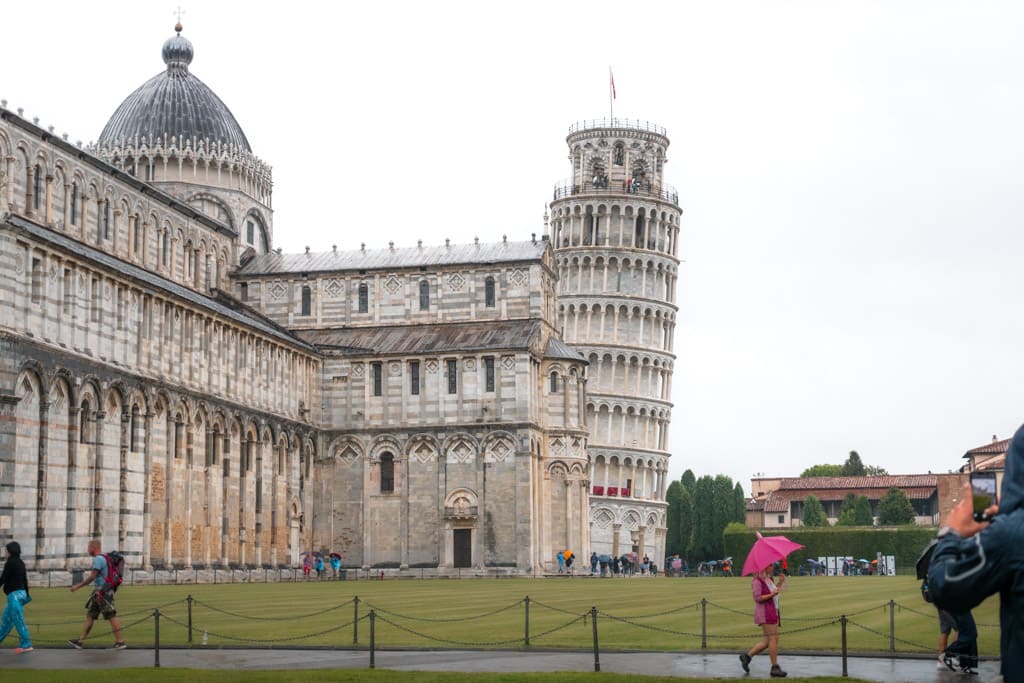
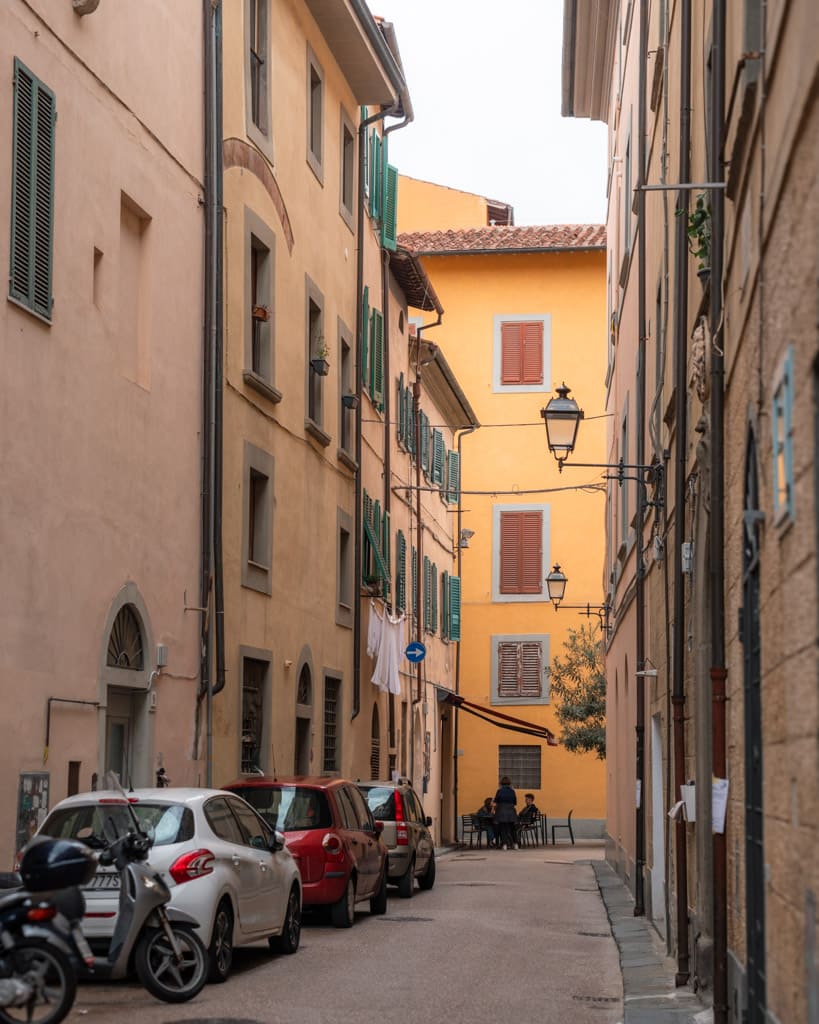
Pisa map and geography
Pretty Pisa is located in the region of Tuscany in central Italy.
Just under 100,000 people live here.

How long to stay in Pisa
How many days you should spend in Pisa depends entirely on your needs and travel plans.
It’s very normal to spend a single day in the city, and we visited Pisa on a day trip from Lucca ourselves.
However, there is more to see than the Leaning Tower of Pisa, so you can easily spend a night or two if you have the time.
We imagine it must be wonderful to walk around the city early in the morning or in the afternoon when all the day-trippers are gone.
If you fly to Pisa before embarking on a longer journey around Tuscany, it’s ideal to start with a night in the city.
Later in this travel guide to Pisa, we write more about the best places to stay (including where to stay on a budget).
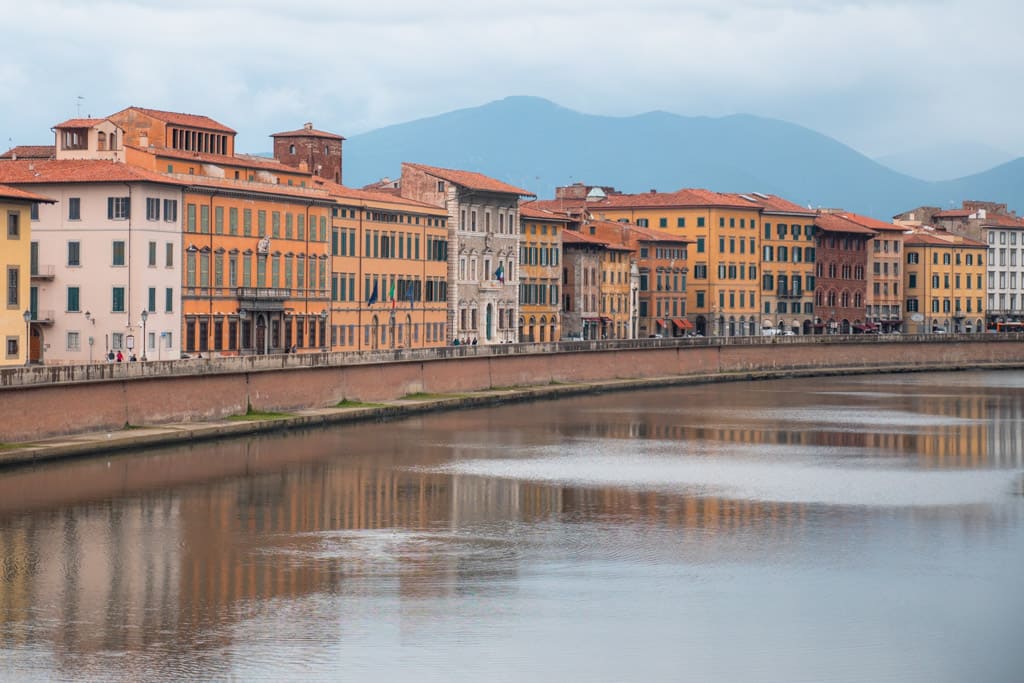
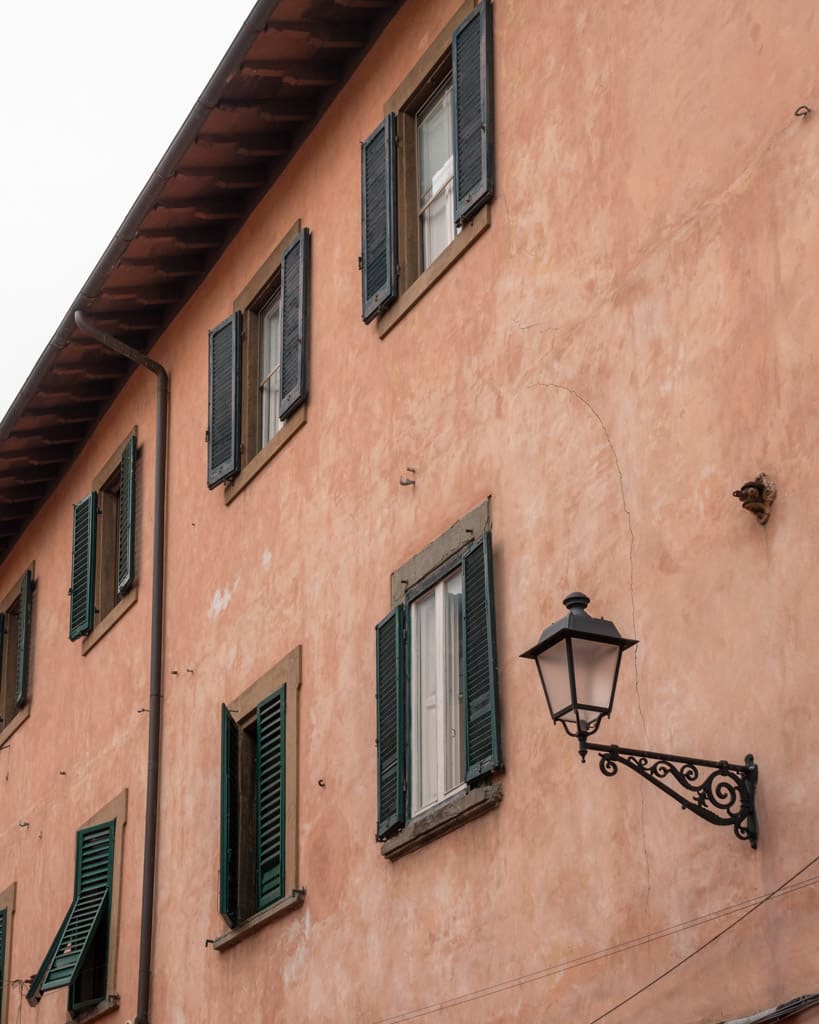
Day trips to Pisa
It’s really popular to go on a day trip to Pisa, for example from Lucca, Florence, Livorno, La Spezia (Cinque Terre) or even from Rome.
If you aren’t planning to stay in the city overnight, you can look at some of the day trips to Pisa from other cities below.
Advertisement
The 16 best things to do and see in Pisa
Here are what we believe to be the best things to do and see in Pisa including interesting attractions, sights, landmarks and viewpoints.
- The Leaning Tower of Pisa – The main reason to visit the city
- Piazza dei Miracoli – The Square of Miracles
- Duomo di Pisa – Pisa Cathedral
- Battistero di San Giovanni – The baptistery
- Campo Santo – The Monumental Cemetery
- Walk along the Arno – The river that runs through Pisa
- Santa Maria della Spina – Church by the river
- Piazza dei Cavalieri – The Knights’ Square
- Sant’Antonio Abate – Church with a colourful mural
- Borgo Stretto – Narrow pedestrian street
- Via Corso Italia – Shopping street with lots of shops
- Botanic Garden – A green oasis
- Palazzo Blu – Museum in a blue palace
- Visit a winery – Taste the local grapes
- Eat gelato – Enjoy real Italian ice cream
- The best day trips from Pisa
Map of the best things to do and see in Pisa.
1. The Leaning Tower of Pisa – The main reason to visit the city
The Leaning Tower of Pisa is an iconic landmark that attracts people from near and far.
The Torre di Pisa (as it is called in Italian) is undoubtedly the main sight in Pisa, and it’s also one of the major highlights of the entire Tuscany region.
And seeing its unique tilt is truly an enjoyable experience.
The free-standing bell tower is famous for its characteristic tilt which it gained due to structural issues encountered during its construction.
Now, exactly because of that tilt, the Leaning Tower of Pisa has become a super popular photo spot, and most days there are a multitude of people posing in silly ways in front of the tower to get the perfect photo.
While admiring the Leaning Tower of Pisa from the outside is free of charge, ascending the tower requires purchasing a ticket – ideally well in advance as the availability is limited and the tickets are issued for specific time slots.
Purchase your ticket to ascend the tower here (adlink) and get a skip-the-line ticket to the cathedral at the same time.
You can also buy a combination ticket (adlink) if you want access to the top of the Leaning Tower of Pisa as well as the baptistery, Campo Santo, the two museums and the cathedral.
Read more about what you need to know before visiting the tower in our travel guide to the Leaning Tower of Pisa.
Tip: If you have the opportunity to arrive early or late in the day, you will encounter significantly fewer crowds.
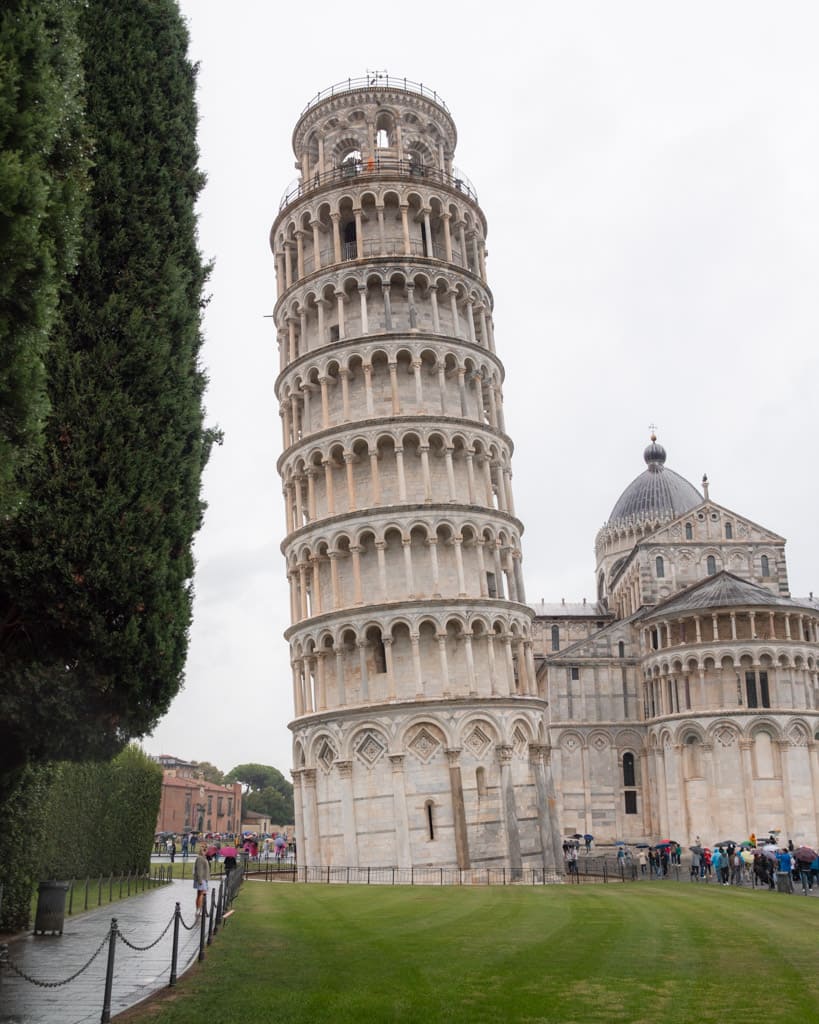
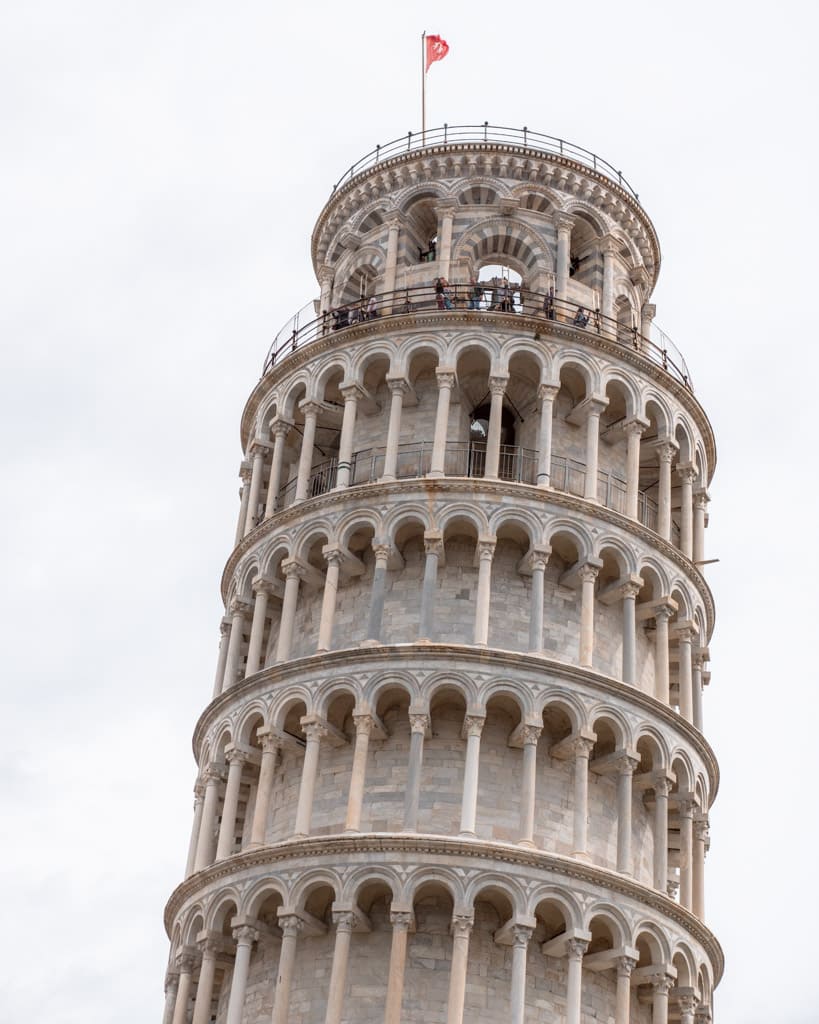
Advertisement
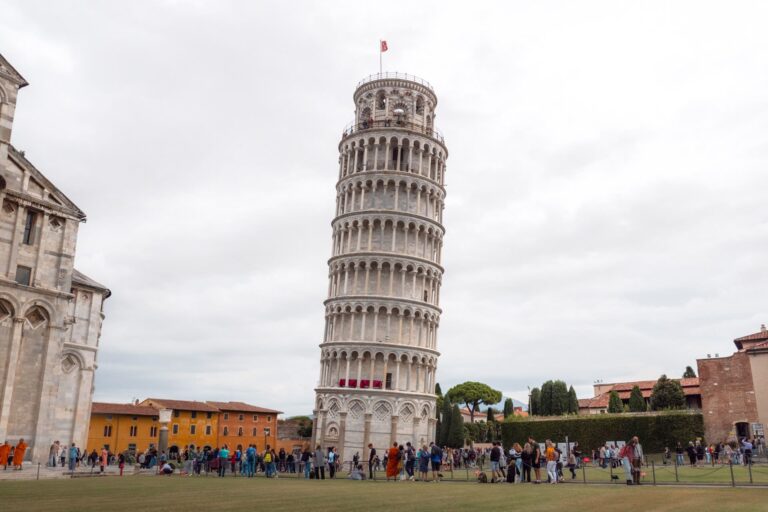
2. Piazza dei Miracoli – The Square of Miracles
The Square of Miracles (known as Piazza dei Miracoli in Italian) is where you’ll find the Leaning Tower of Pisa.
Apart from the tilting architectural wonder, there is actually much more to see at the square. Here, you can leisurely wander and capture plenty of photographs at your own pace.
The Square of Miracles holds immense historical and cultural significance for Pisa – and Italy as a whole – and its significance has led to its inclusion on the UNESCO World Heritage List.
Below we write more about the other impressive buildings on the square.
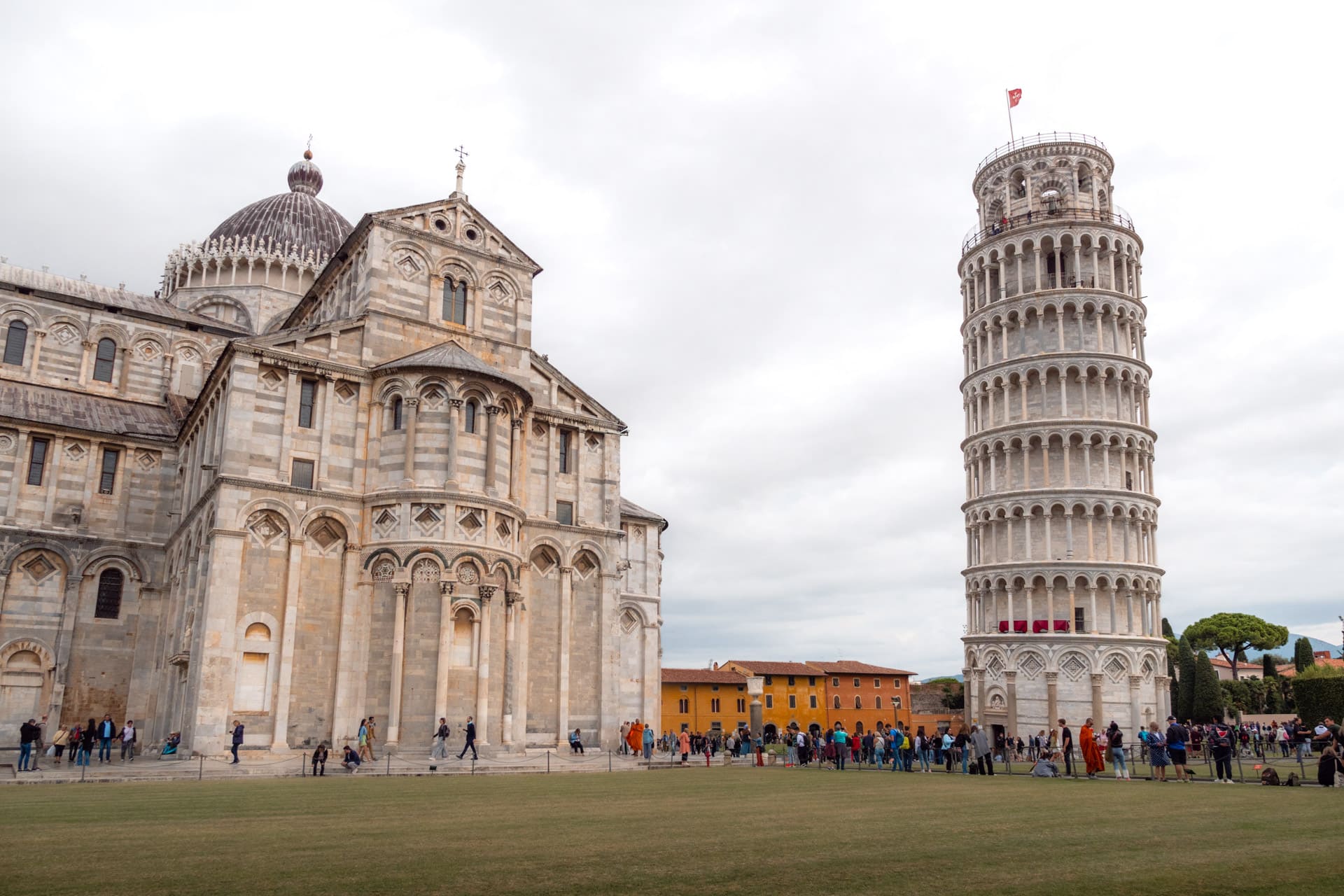
3. Duomo di Pisa – Pisa Cathedral
Every major Italian city has a duomo (meaning cathedral) and the Pisa Cathedral is right beside the Leaning Tower of Pisa.
In fact, the tower was originally intended as a bell tower for the cathedral. However, it has since surpassed the cathedral in fame and recognition.
That doesn’t make the cathedral any less interesting, though.
The Duomo di Pisa is the oldest structure in the Square of Miracles, and you should definitely take the time to admire the beautiful Romanesque facade.
Inside the cathedral, there are paintings, sculptures and frescoes.
Entry to the cathedral is free, but you’ll need an entrance ticket. These are available at the on-site ticket offices and they are valid for a specific time slot.
If you hold tickets for the other attractions on the Square of Miracles, you’re not bound by a designated time slot and can often bypass queues.
This applies to this ticket to the Leaning Tower of Pisa and the combination ticket (adlinks).
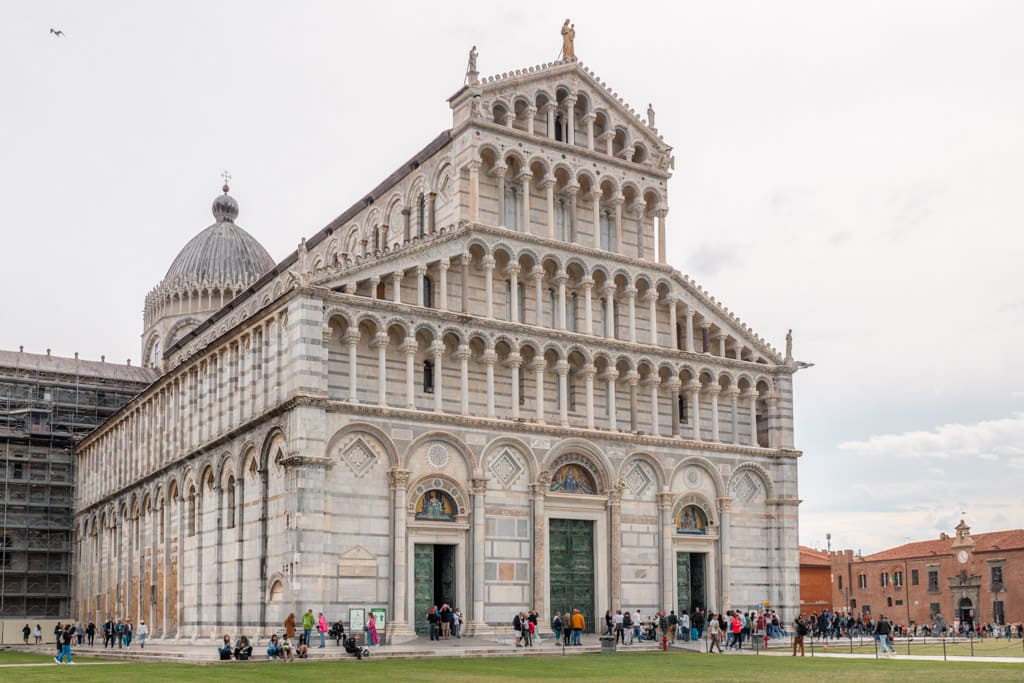
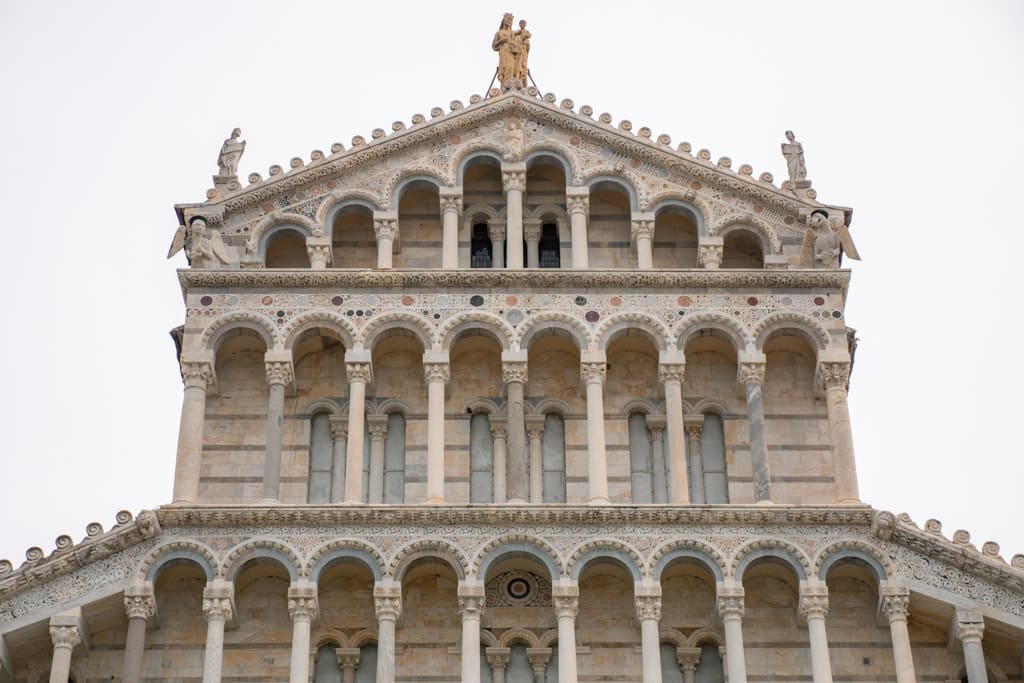
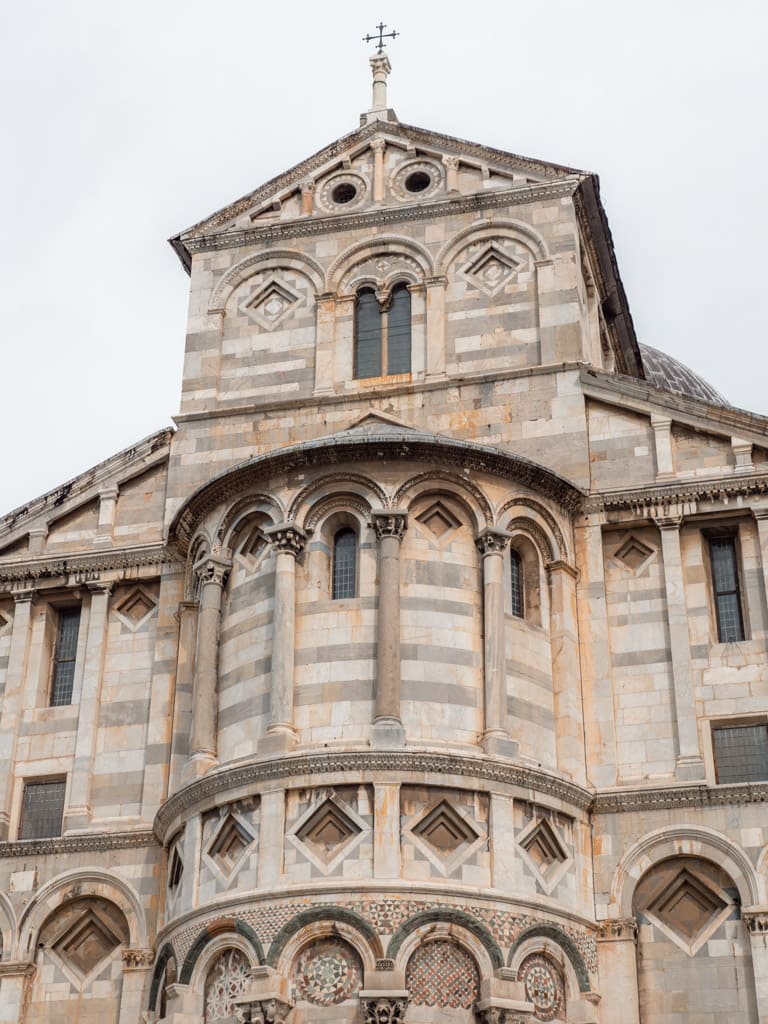
4. Battistero di San Giovanni – The baptistery
Often overlooked, we think that the baptistry in the Square of Miracles, Battistero di San Giovanni, is an incredibly beautiful structure in its own right, despite being overshadowed by its towering neighbours.
The impressive round building is positioned in front of the cathedral and with an entrance ticket, you can explore its interior and view the baptism font in the center of the room.
From the top floor, you can also enjoy a unique vantage point overlooking the cathedral, offering a unique perspective on its magnificent facade.
Access to the Battistero di San Giovanni requires buying a ticket. It can either be purchased separately or as a combination ticket (adlink) where you get access to the other attractions on the square, too.
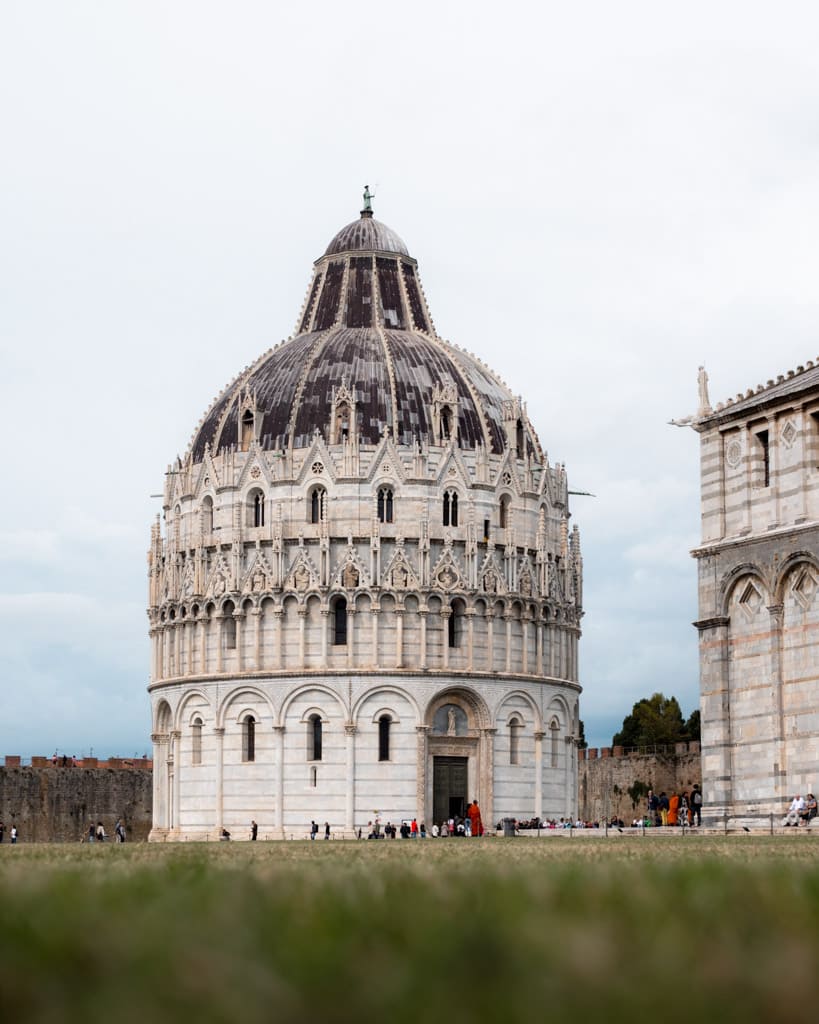
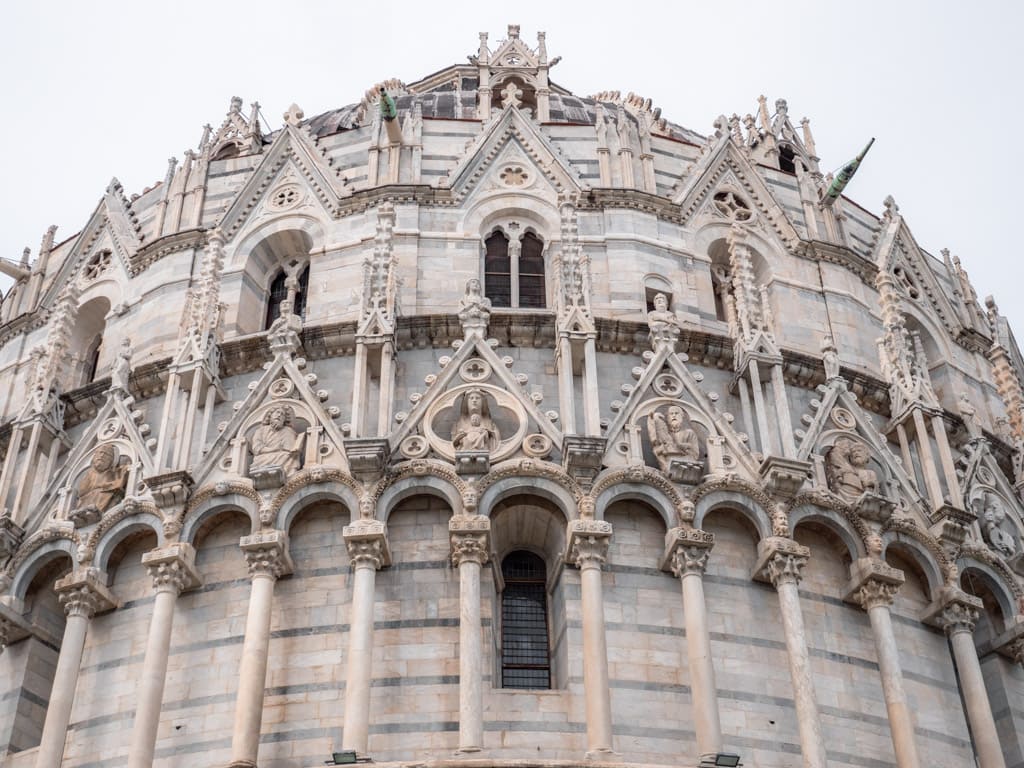
Advertisement
5. Campo Santo – The Monumental Cemetery
Campo Santo, also known as Camposanto Monumentale (which translates to the Monumental Cemetery), is an oblong building in Gothic style consisting of three chapels, sculptures and frescoes on the walls.
Although it may not be the most eye-catching attraction at The Square of Miracles, the historic cemetery is still worth stopping by.
Like the baptistery, Campo Santo requires a ticket. You can buy a separate ticket for the cemetery or a combination ticket (adlink) with access to several of the attractions on the Square of Miracles.
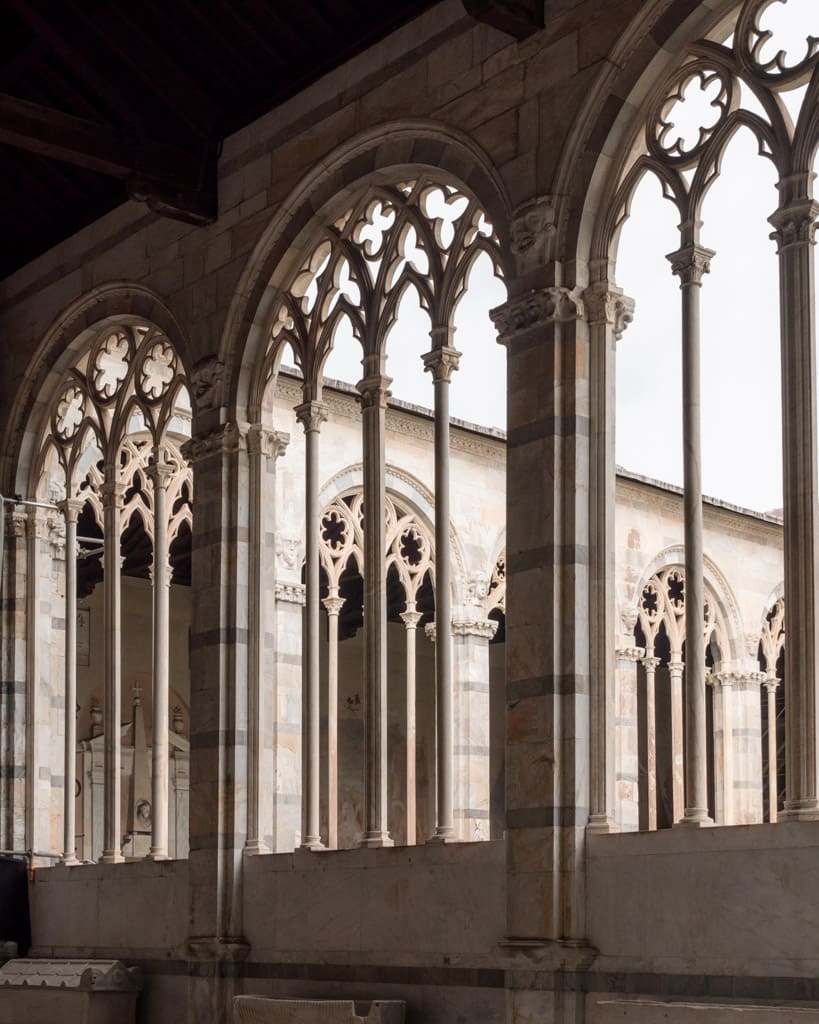
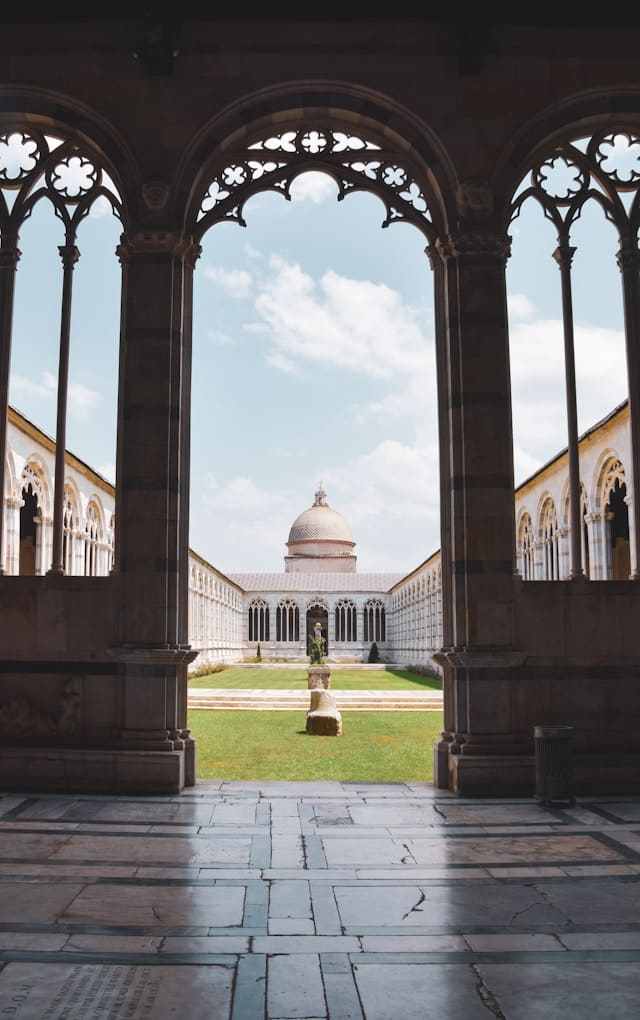
6. Walk along the Arno – The river that runs through Pisa
The Arno River is a long waterway that runs through the Tuscan countryside (including the city of Florence) before eventually reaching its destination at Pisa, where it meets the sea.
The river has had a significant role in shaping Pisa’s history and culture – especially in the city’s trade and transport networks.
And it makes Pisa so much more charming!
We enjoyed a relaxing, romantic stroll along the riverbank and we highly recommend setting aside time for a similar experience.
You can also consider crossing the bridge Ponte di Mezzo for a picturesque view of the Arno.
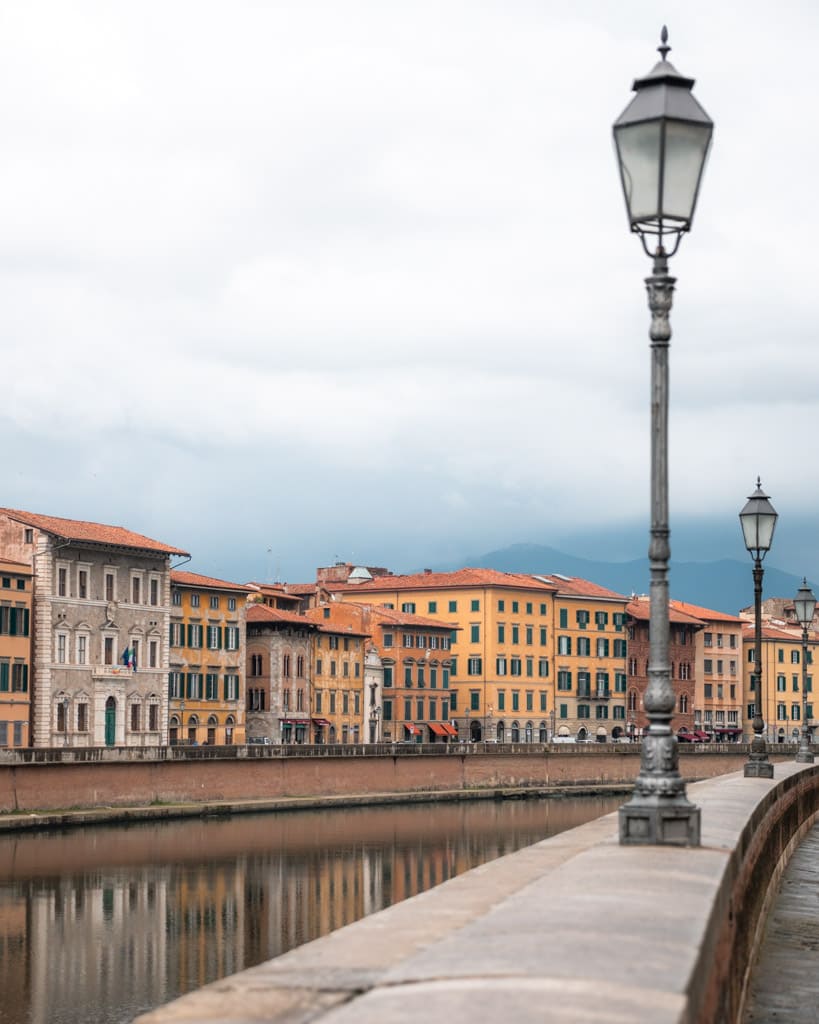
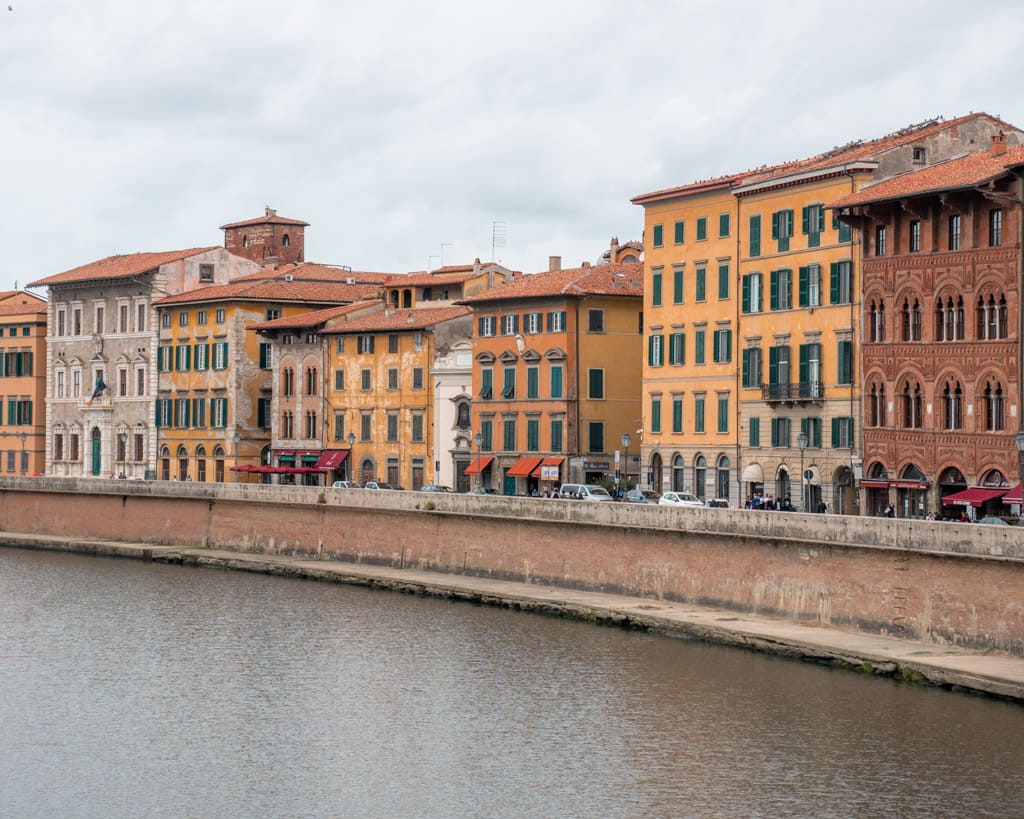
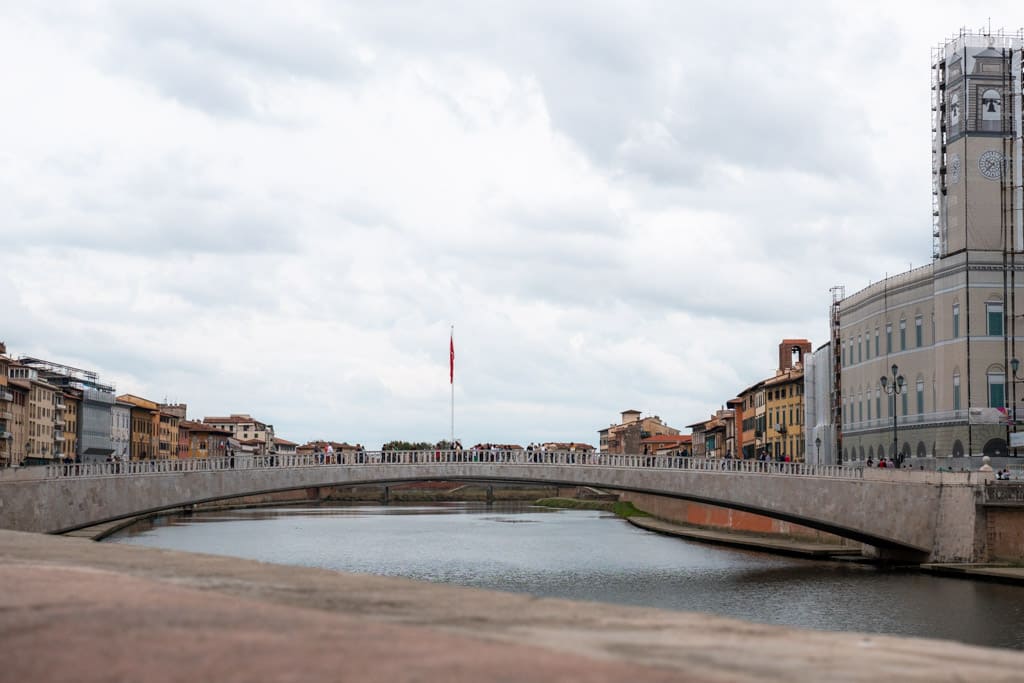

7. Santa Maria della Spina – Church by the river
As you stroll along the Arno, make sure to stop by the Gothic church of Chiesa di Santa Maria della Spina, situated along the riverbank.
Despite its modest size, the church boasts exquisite details and decorations – and the location is truly unique.
Legend has it that the church once safeguarded a thorn from Jesus’ crown of thorns… We can only guess whether it’s true or not, but the tale has drawn pilgrims to its doors over the centuries.
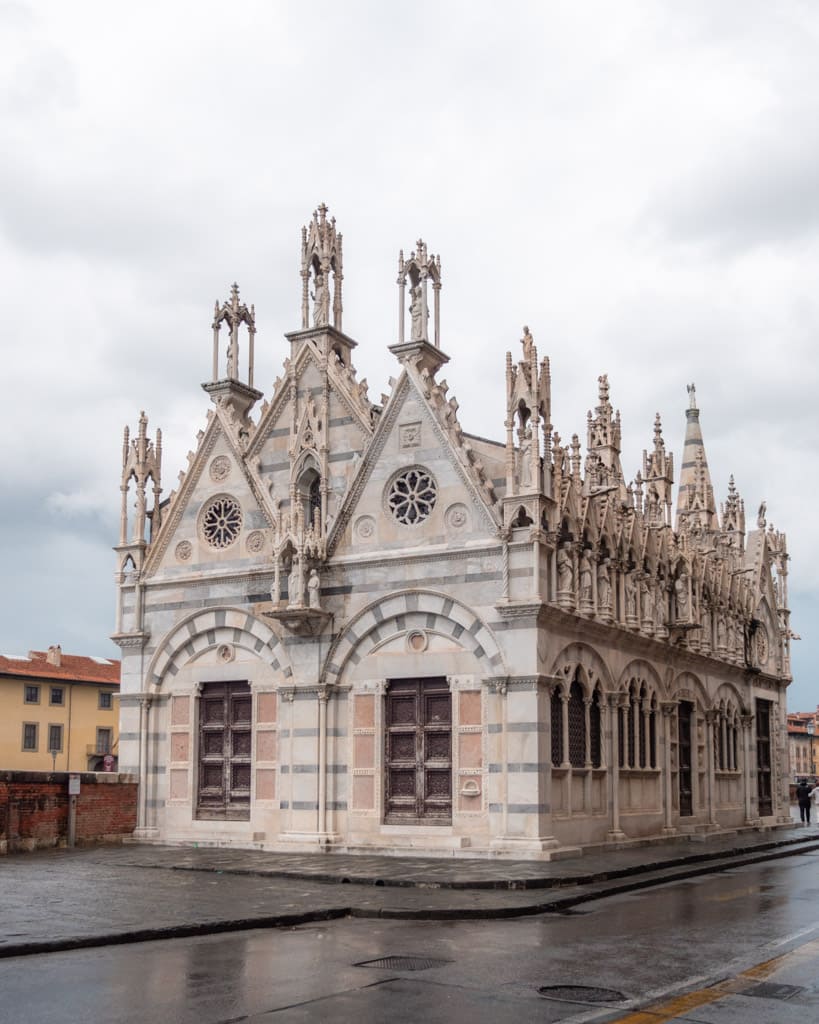
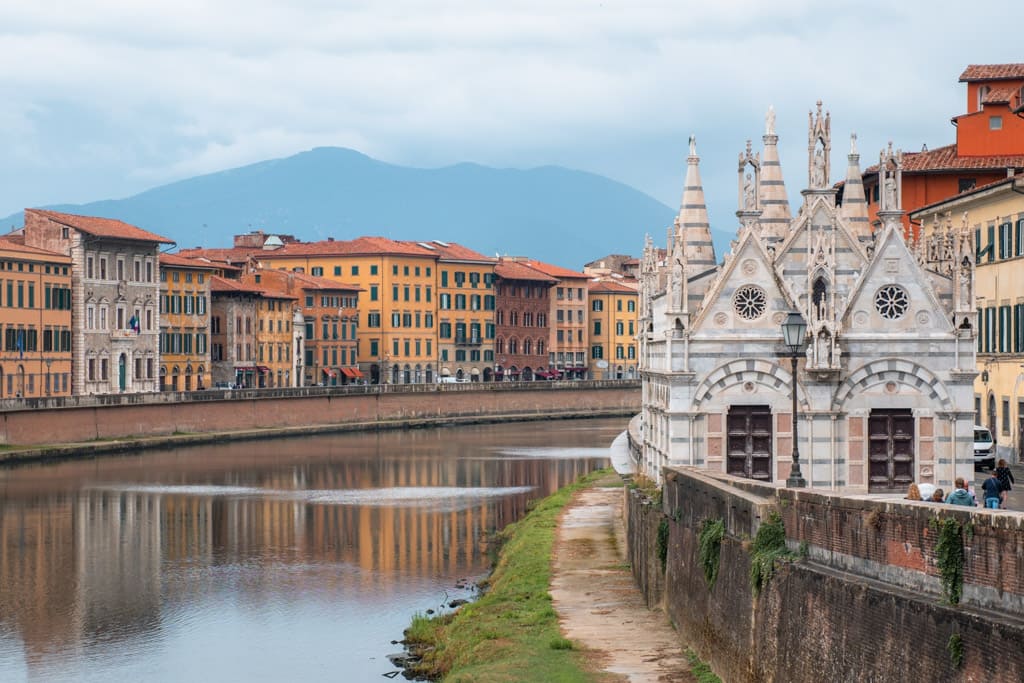
8. Piazza dei Cavalieri – The Knights’ Square
The Knights’ Square (Piazza dei Cavalieri) is a spacious square just a 10-minute stroll from the Leaning Tower of Pisa.
The square is distinguished by the Palazzo dei Cavalieri (also known as the Palazzo della Carovana).
The palace dates back to the middle of the 16th century and was originally used as the headquarters of a Roman Catholic Tuscan military order.
Today, it serves as the main building of the University of Pisa Scuola Normale Superiore di Pisa.
Within Piazza dei Cavalieri, you’ll also discover the churches of Santo Stefano dei Cavalieri and San Rocco next to several other impressive buildings. Don’t miss the striking statue of Cosimo I, who held the titles of Duke of Florence and later Grand Duke of Tuscany.
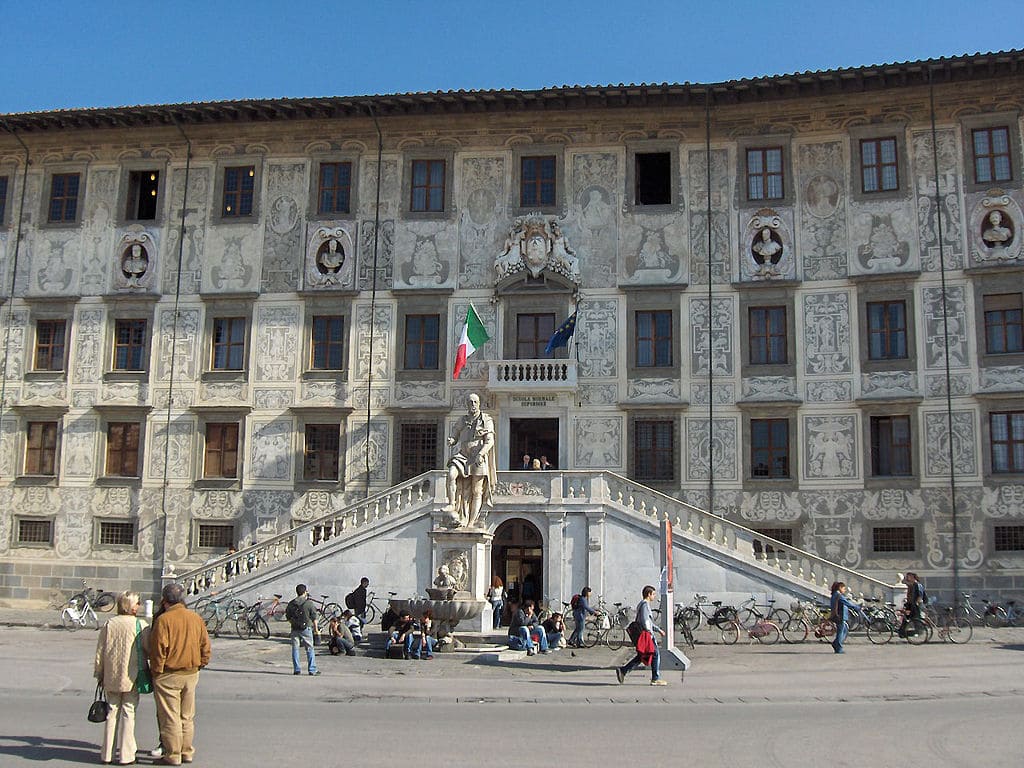
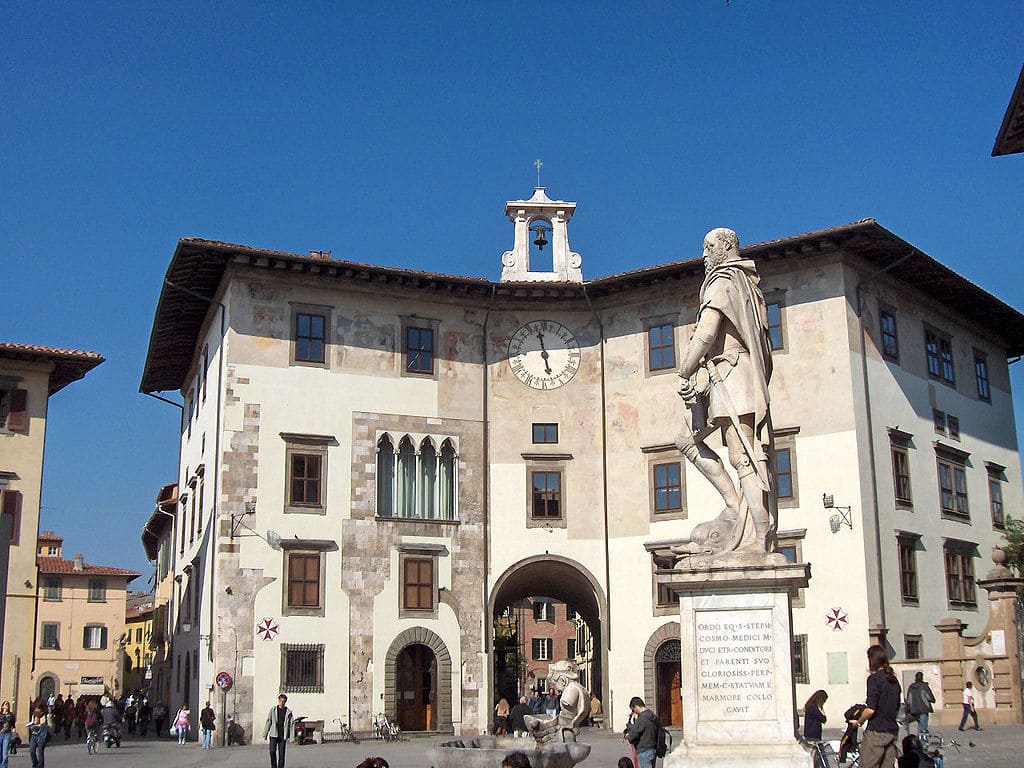
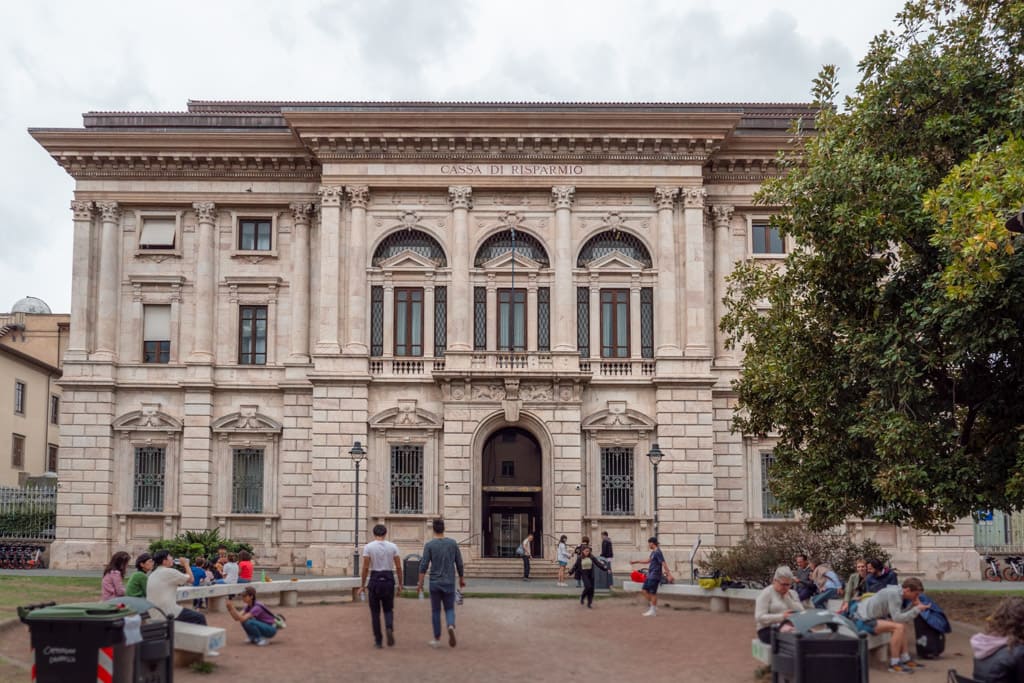
9. Sant’Antonio Abate – Church with a colourful mural
Near Pisa’s Central Station stands a church renowned for its distinctive rear wall.
Chiesa di Sant’Antonio Abate features a striking modern mural titled “Tuttomondo” adorning its wall.
This public artwork, created by American artist Keith Haring, is a rare sight within a traditional church setting which is why we found it interesting to see.
While it’s not one of the top things to do in Pisa, we still wanted to include it in our travel guide. Stop by if you find yourself with plenty of time in Pisa.
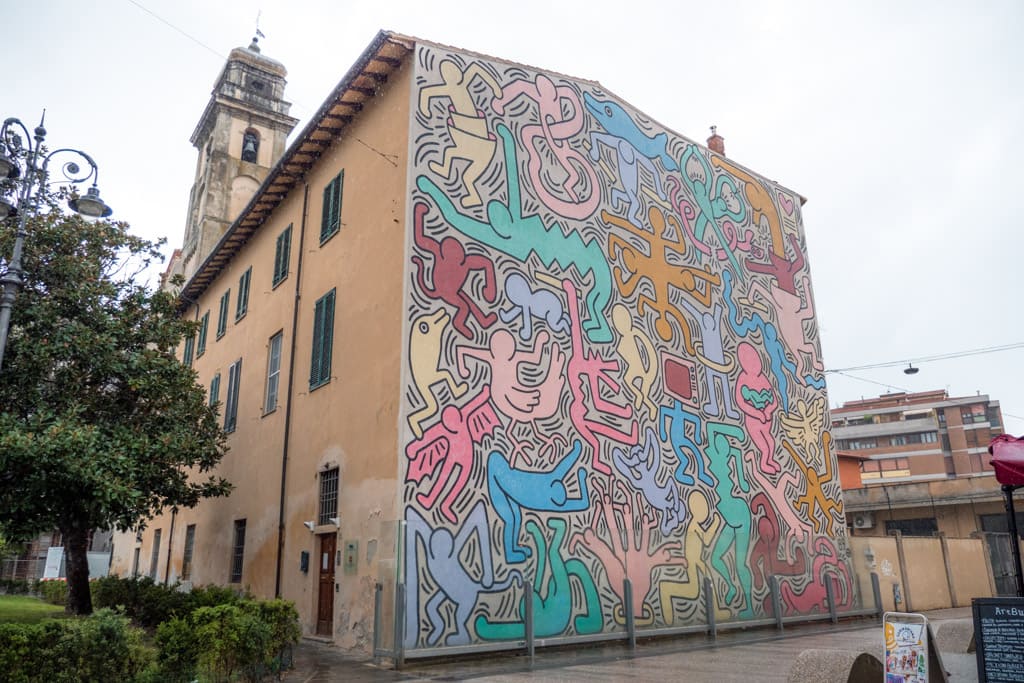

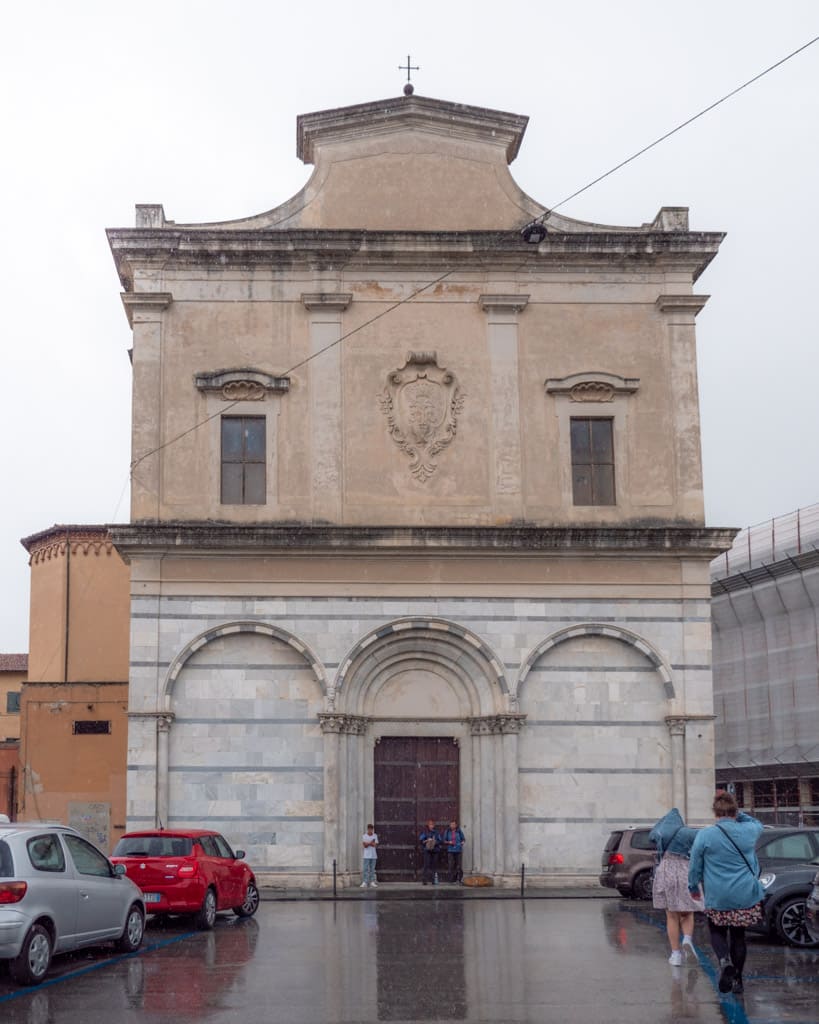
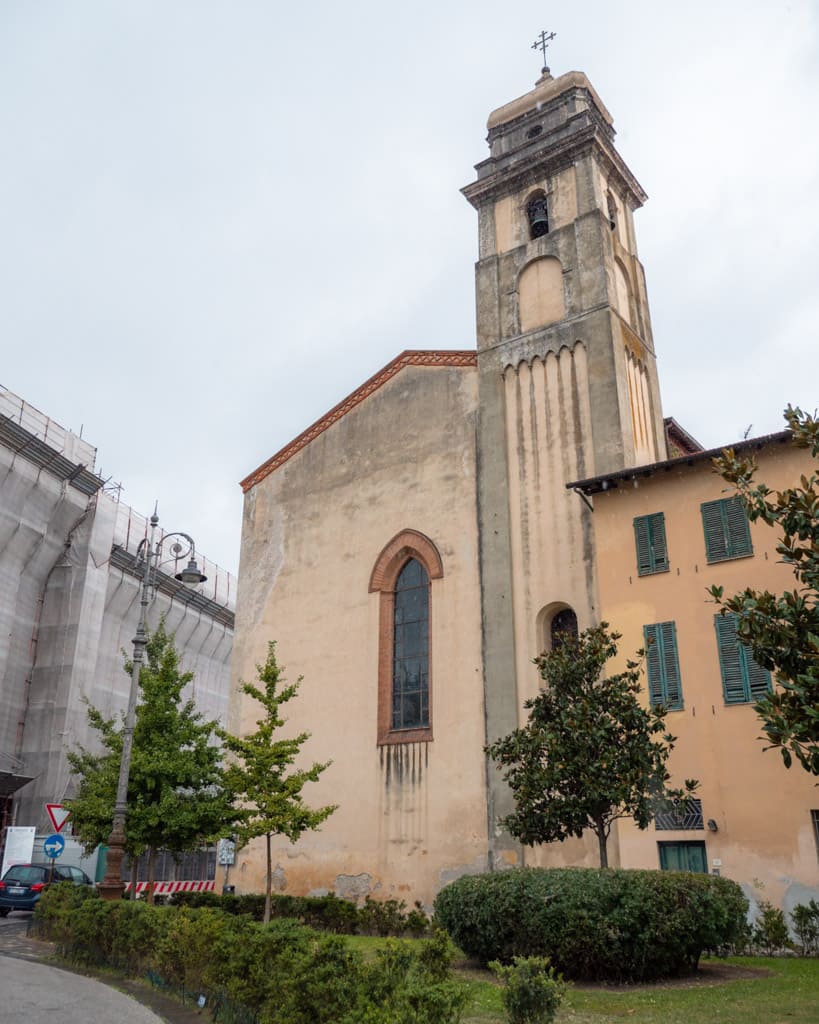
10. Borgo Stretto – Narrow pedestrian street
Located between Piazza dei Cavalieri and the Ponte di Mezzo bridge crossing the Arno River, you will find Pisa’s cosy pedestrian street, Borgo Stretto.
This narrow shopping street offers a pleasant ambience for leisurely strolls with lots of terracotta-coloured houses, quaint shops and, of course, Italian cafes where you can savour a quick espresso or indulge in other drinks and snacks.
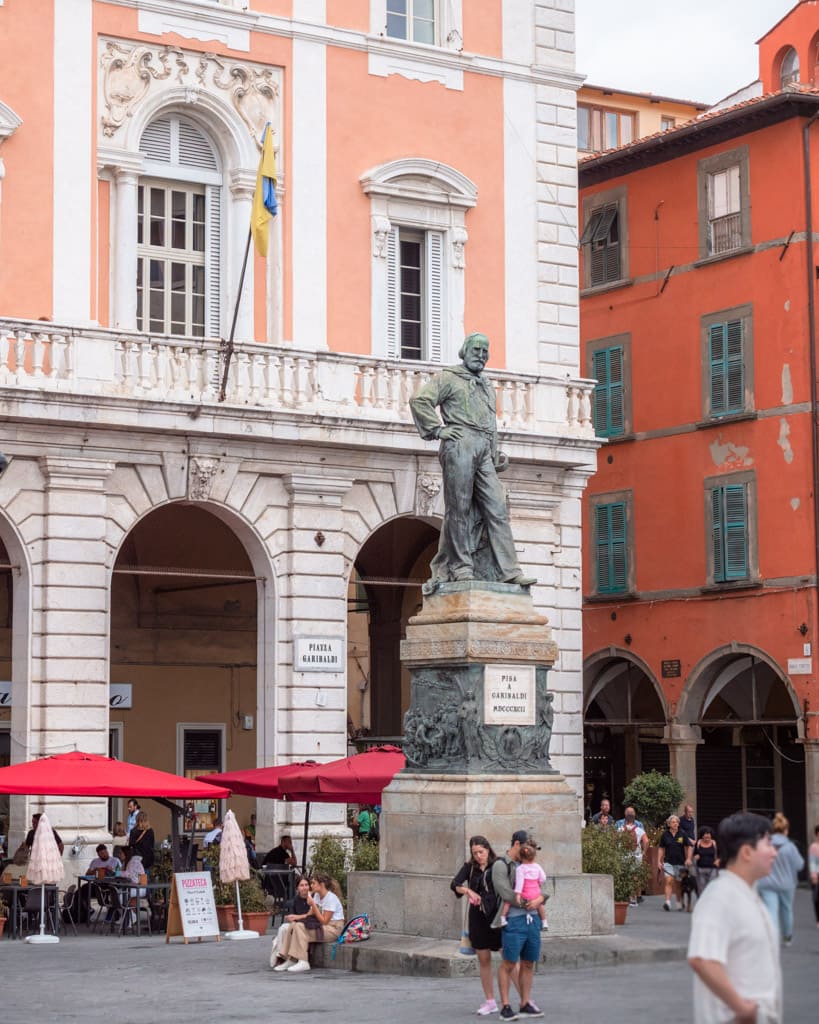
11. Via Corso Italia – Shopping street with lots of shops
Across the Ponte di Mezzo lies the primary shopping street, perfect for a stroll if you find yourself south of the river.
Via Corsa Italia stretches all the way to Piazza Vittorio Emanuele II (where you’ll find the Sant’Antonio Abate church with the mural), thus connecting the Central Station with the historic city centre.
Along the shopping street, you’ll discover souvenir shops, upscale design boutiques and prominent retailers.
And of course, there’s no shortage of restaurants, cafes and gelaterias.
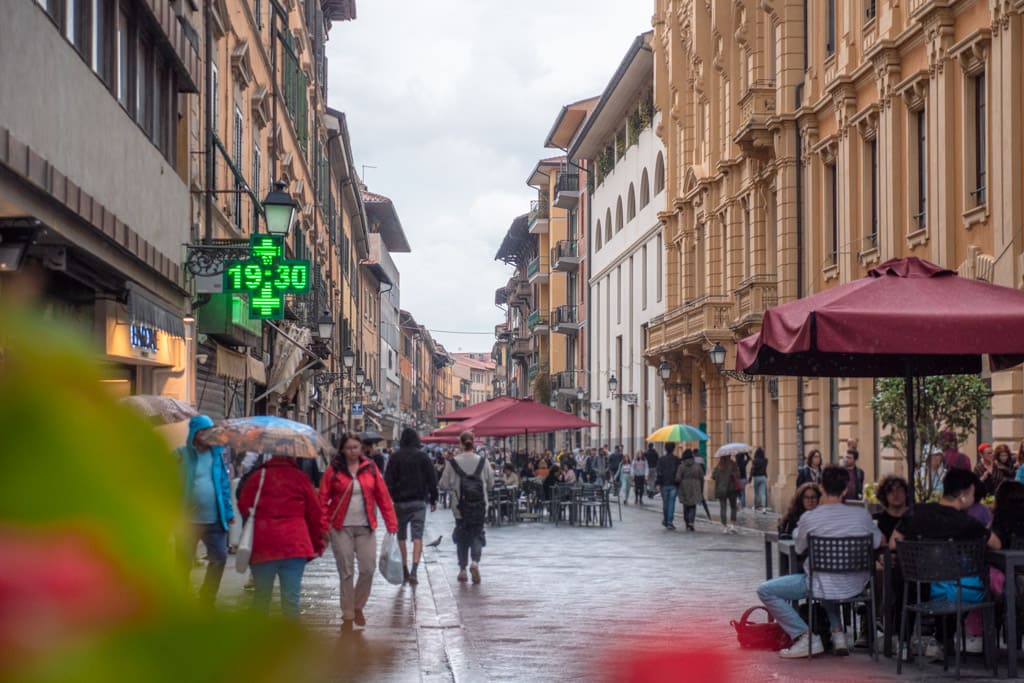
12. Botanical Garden – A green oasis
Pisa’s botanical garden, Orto Botanico di Pisa, is right in the middle of the city only a few minutes south of the Leaning Tower.
The University of Pisa is responsible for maintaining the old garden. Within this green sanctuary, you’ll discover a botanical school, tranquil lakes, greenhouses and a diverse array of exquisite trees, flowers and herbs.
A serene haven for nature enthusiasts or those seeking a break from the hustle and bustle of urban life.
The admission fee for adults is 4 euros in 2024 (~ 4.3 USD). On the first Sunday of the month, the entry is free for all.
Read more about the botanical garden on their official website.
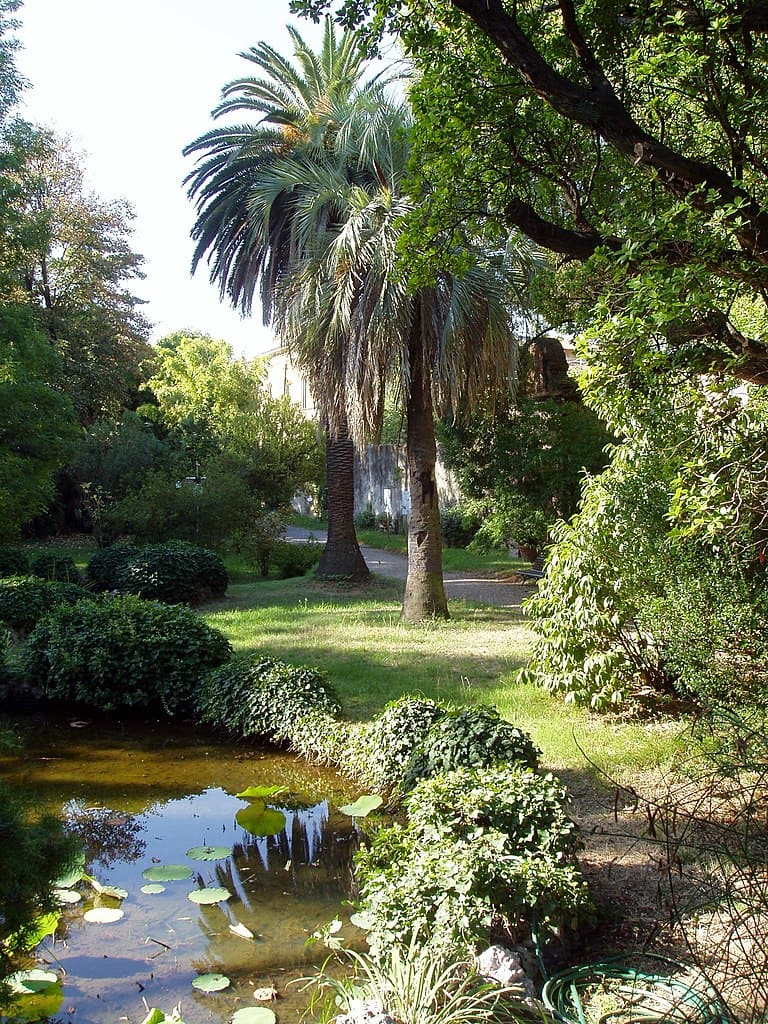
13. Palazzo Blu – Museum in a blue palace
Palazzo Blu is located on the southern side of the Arno River between the Church of Santa Maria della Spina and the Ponte di Mezzo bridge.
As the name suggests, it’s a blue palace that stands out from Pisa’s earth-coloured houses with its dusty light blue colour.
The palace serves as a museum and has both permanent and temporary exhibitions.
The entry price for adults is 5 euros in 2024 (~ 5.4 USD) but there are reduced prices for groups and families.
Read more about the museum on their official website.
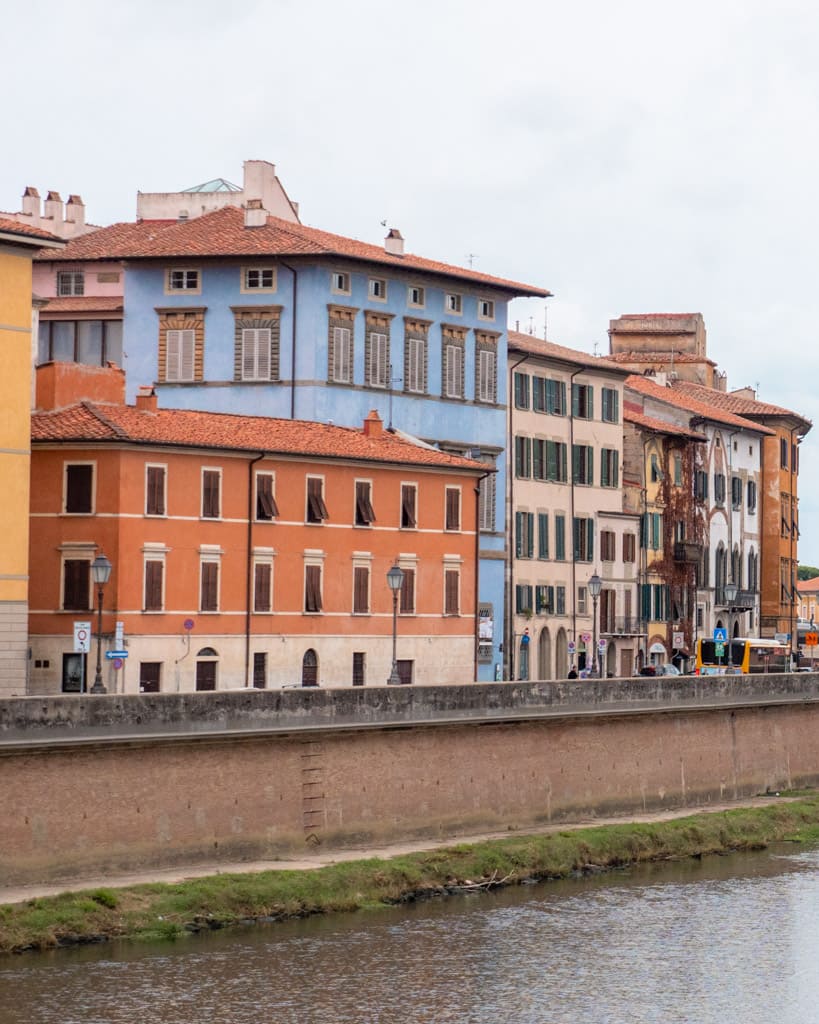
14. Visit a winery – Taste the local grapes
For wine enthusiasts, the region boasts numerous wineries open for tastings of the local grapes.
Usually, these tours include a visit to the vineyards and the cellars where you get a glimpse into the winemaking process.
Afterwards, you get to indulge in a wine tasting accompanied by insights into each wine’s unique qualities – all while soaking in the scenic vistas of the Tuscan countryside.
The wine tours come in various durations, levels of privacy and price ranges. Read more about each tour by clicking on the options below.
Advertisement
15. Eat gelato – Enjoy real Italian ice cream
We can’t make a guide to an Italian city without mentioning gelato.
You’ll find excellent gelato shops almost everywhere, offering creamy Italian ice cream that (in our opinion) surpasses the taste of regular ice cream.
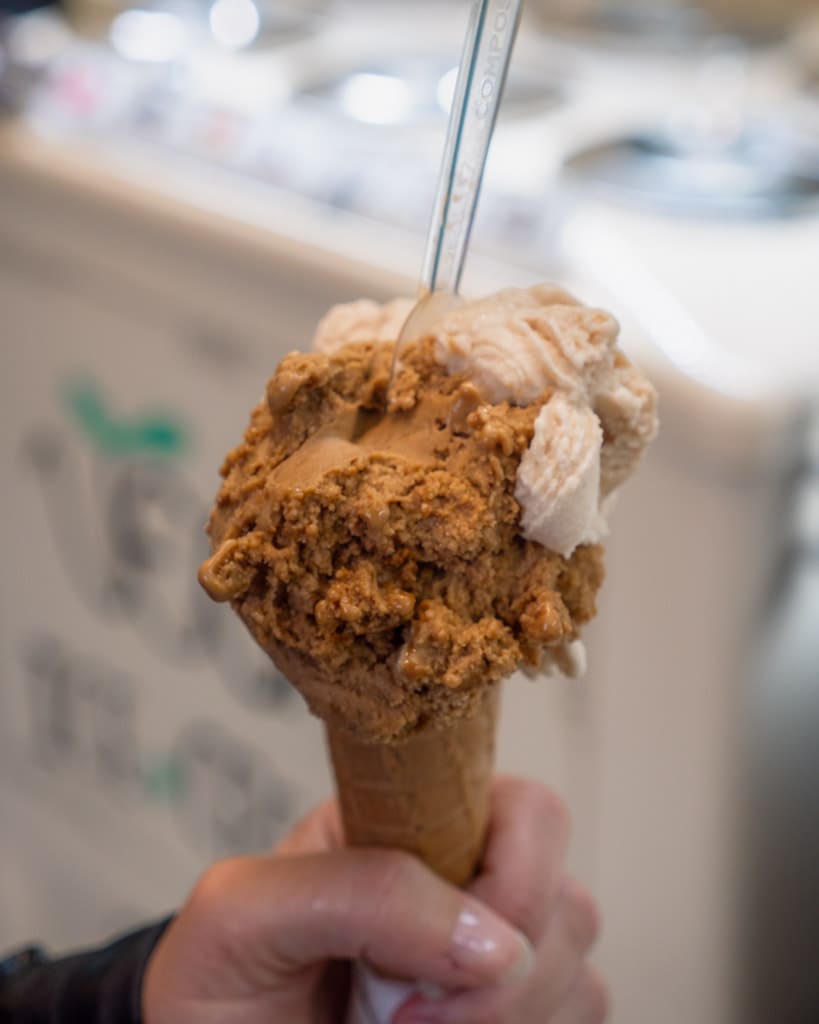
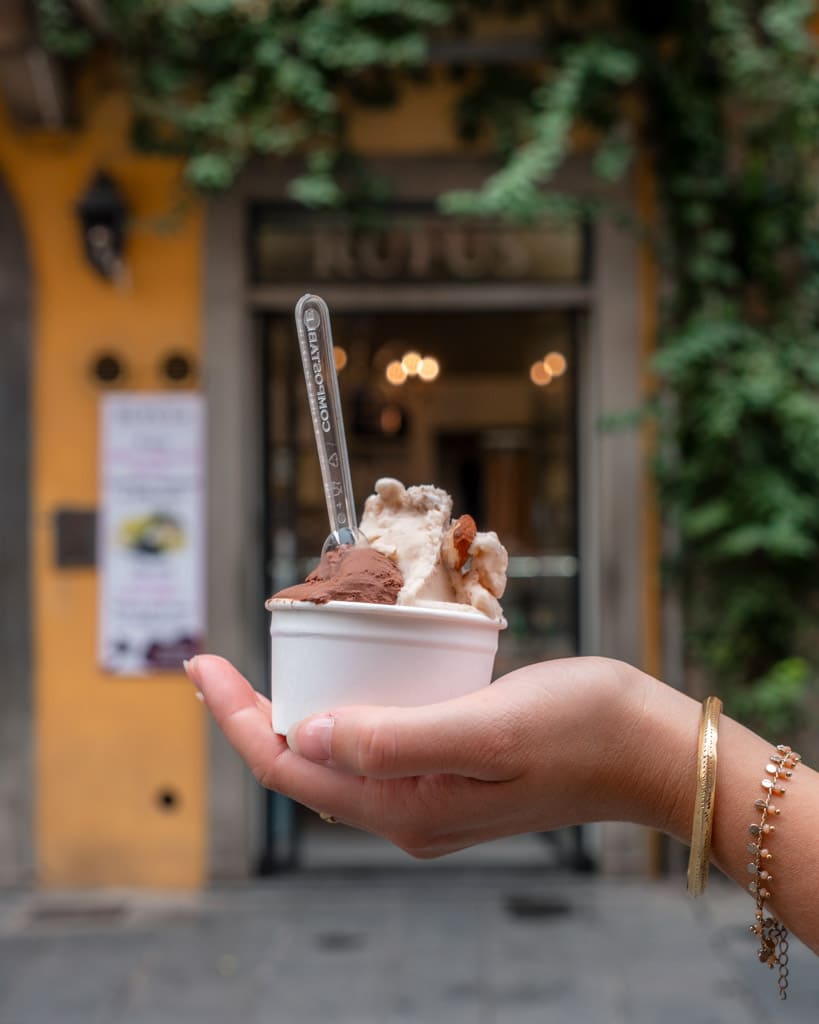
16. The best day trips from Pisa
Within a relatively short distance of Pisa, you can visit a multitude of small and large cities, all of which offer staggering amounts of history, art and, not least, fantastic food.
Here are the most prominent cities to consider for day trips from Pisa:
- Lucca. In just 30 minutes by train or car, you can reach the charming medieval city of Lucca known for its intact ancient city wall.
- Florence. It’s just under an hour by train to some of the world’s most iconic landmarks.
- Cinque Terre. Drive to La Spezia in approximately 1 hour by car or train and use local transport to get to the famous five colourful cities.
- Siena. It takes approximately 2 hours and 20 minutes by train (or 1 hour and 45 minutes by car), and then you are in one of Tuscany’s absolute prettiest cities.
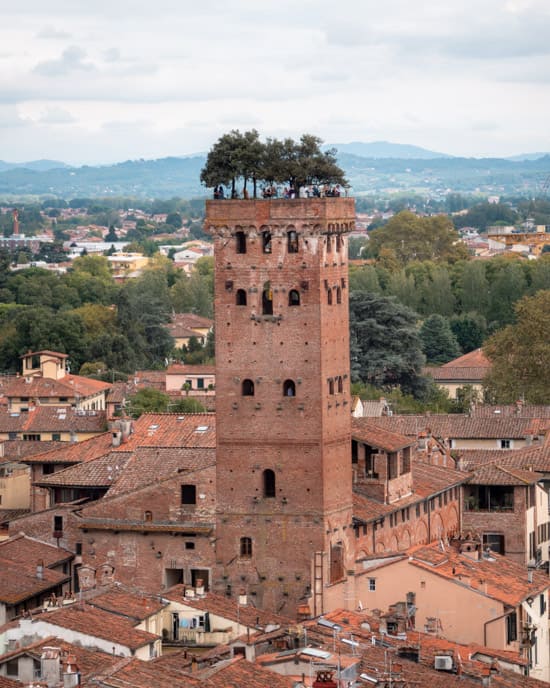
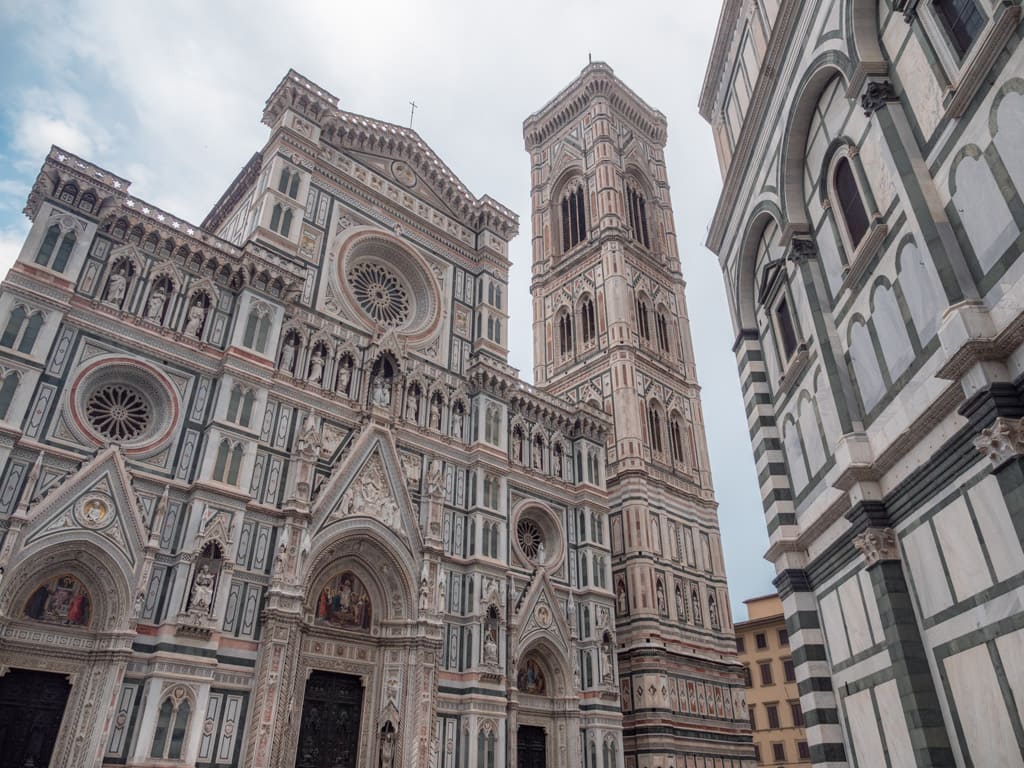
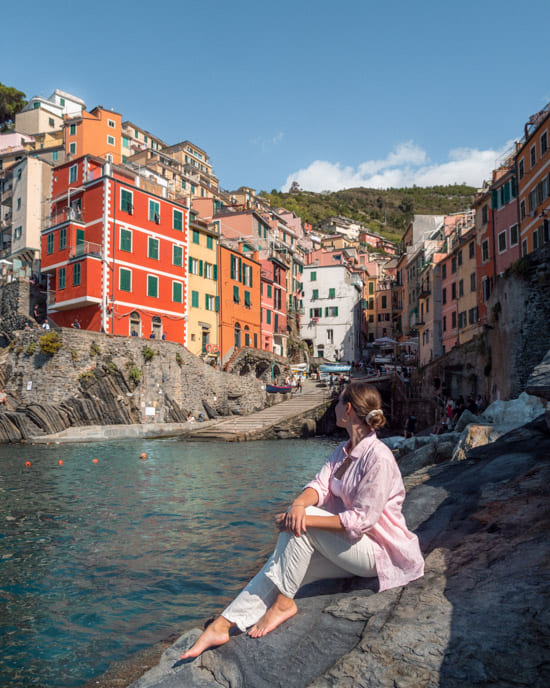
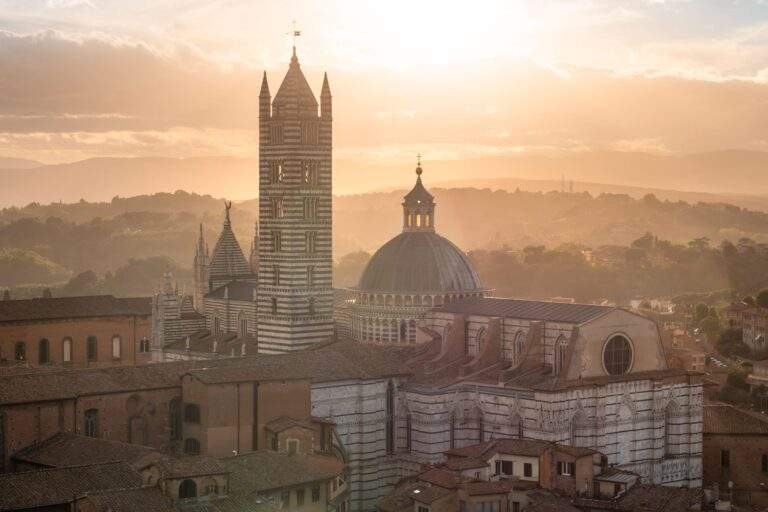
Map of the best things to do and see in Pisa
Here is a map of all the mentioned experiences and sights in Pisa.
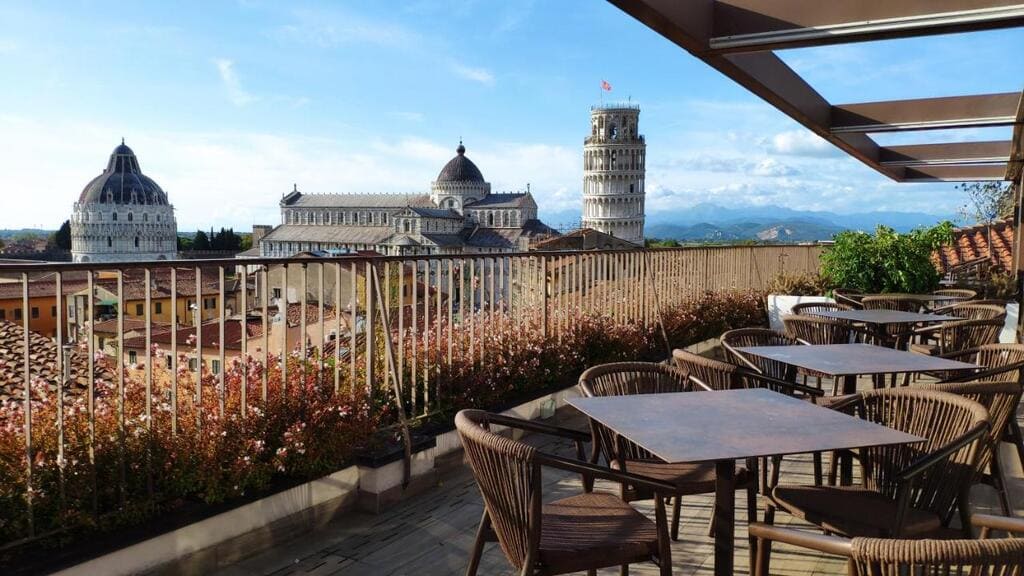
Where to stay in Pisa
Pisa is a relatively compact city and proximity to the Leaning Tower and the Square of Miracles are key considerations for most visitors – as well as access to train or plane connections for those not driving around Tuscany.
The city offers a wide range of mid-range hotels providing excellent value for money. Additionally, we’ve curated a selection of hotels offering a slightly higher standard along with two budget-friendly options.
We have written a travel guide to the best hotels in Pisa, where we share more photos and write about each hotel.
Here’s an overview of the best hotels in Pisa.
Our favourites: Where to stay in Pisa?
- Luxury: Palazzo Cini Luxury Rooms In Pisa – Boutique hotel with a great location and nice details.
- Luxury: Bagni di Pisa Palace & Thermal Spa – 5-star palace with spa and natural hot springs just outside Pisa.
- Value for money: Relais dei Mercanti B&B and Suites – Cosy little place in the old town with excellent reviews.
- Value for money: Hotel Bologna – Splendid mid-range hotel with everything you need and solid breakfast.
- Budget: My Way – One of Pisa’s cheaper hotels within walking distance to both the airport and the train. The Leaning Tower is a 40-minute walk away. A solid option.
- Budget: Hotel Caffè Verdi – Comfortable, simple rooms a 15-minute walk from the Leaning Tower. 24-hour reception/café.
Search for the cheapest and best hotels in Pisa here.
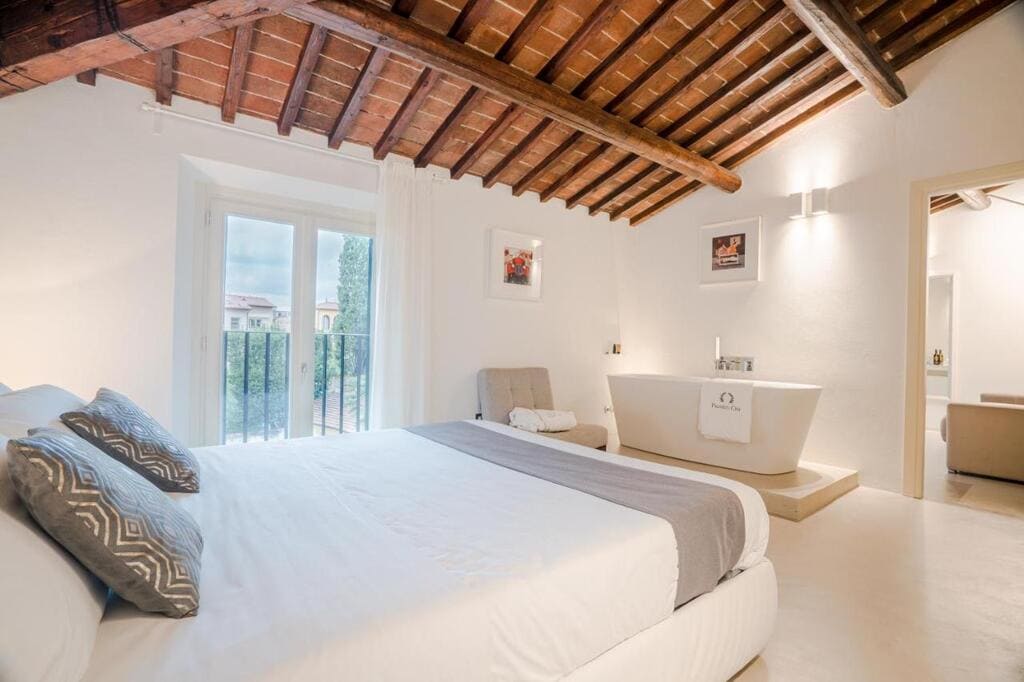
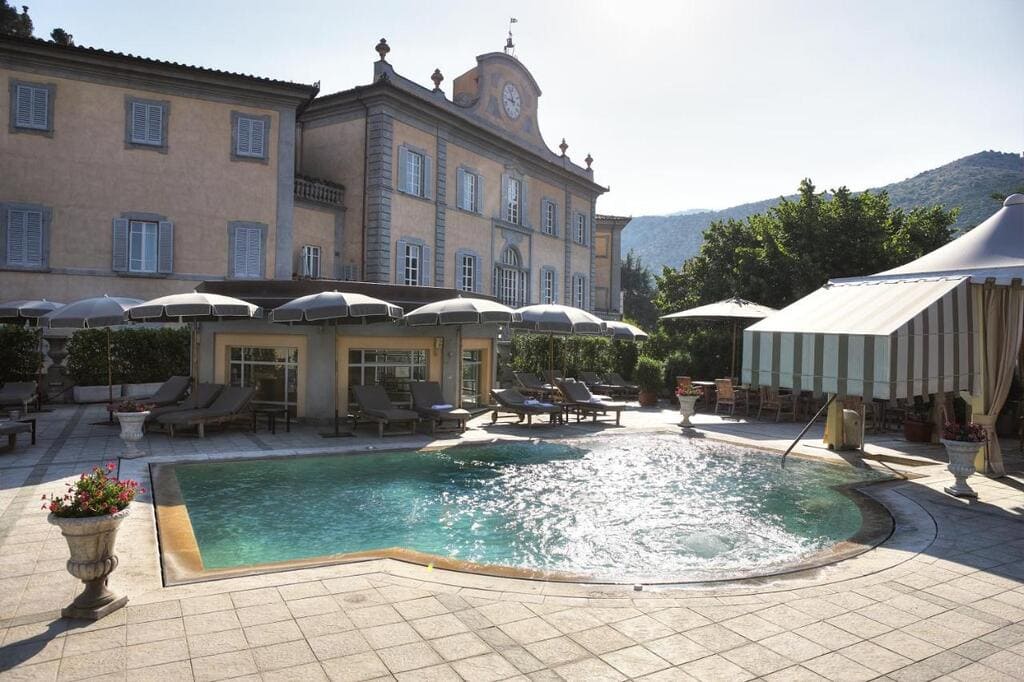
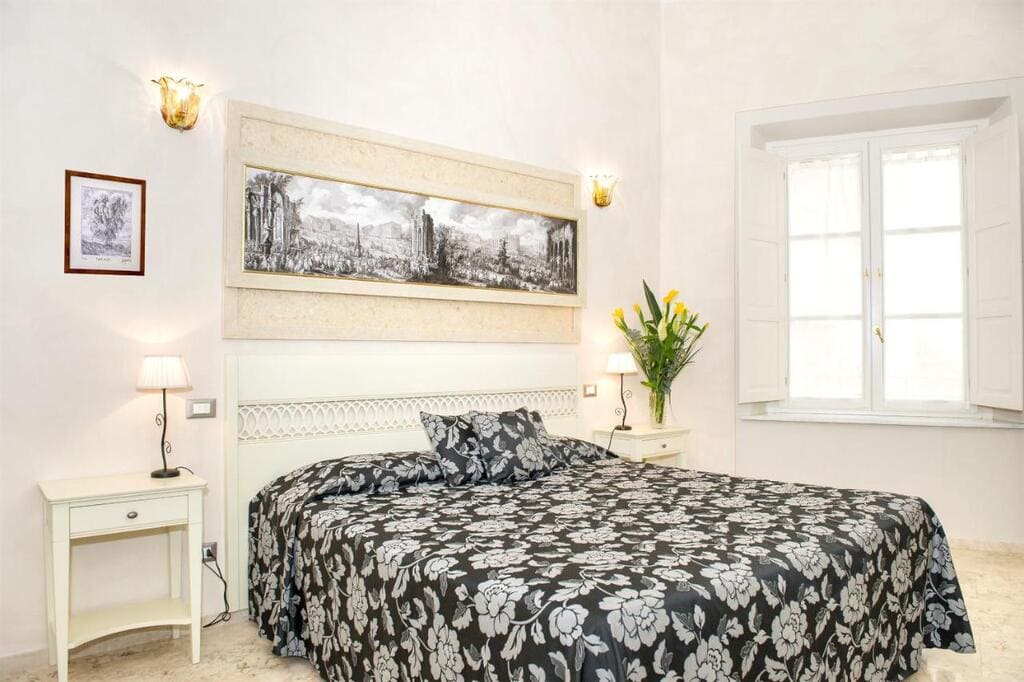
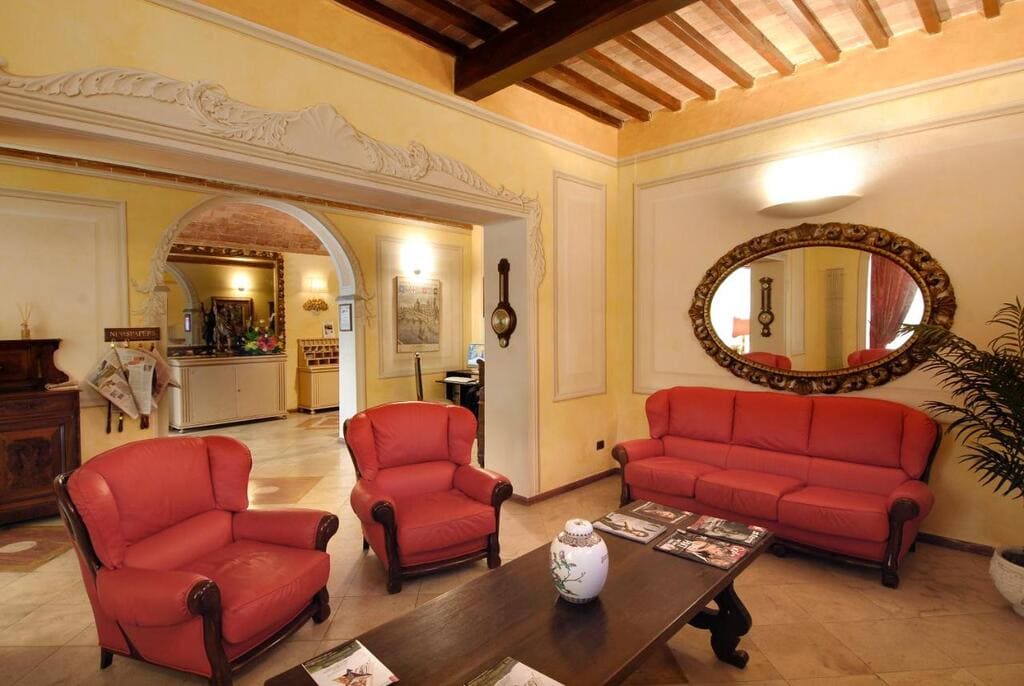
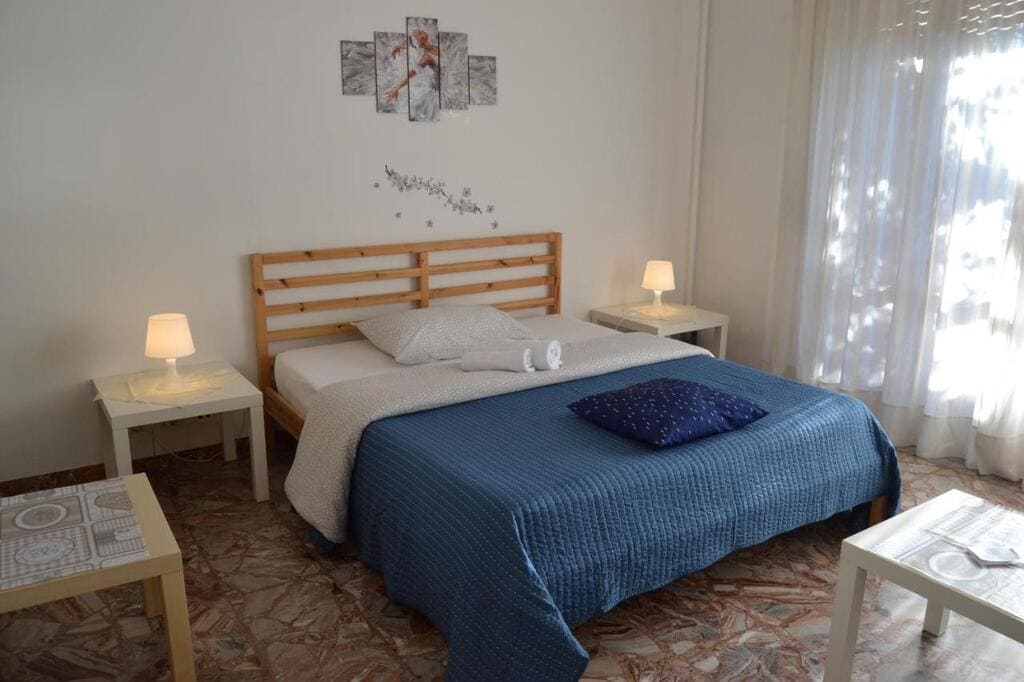
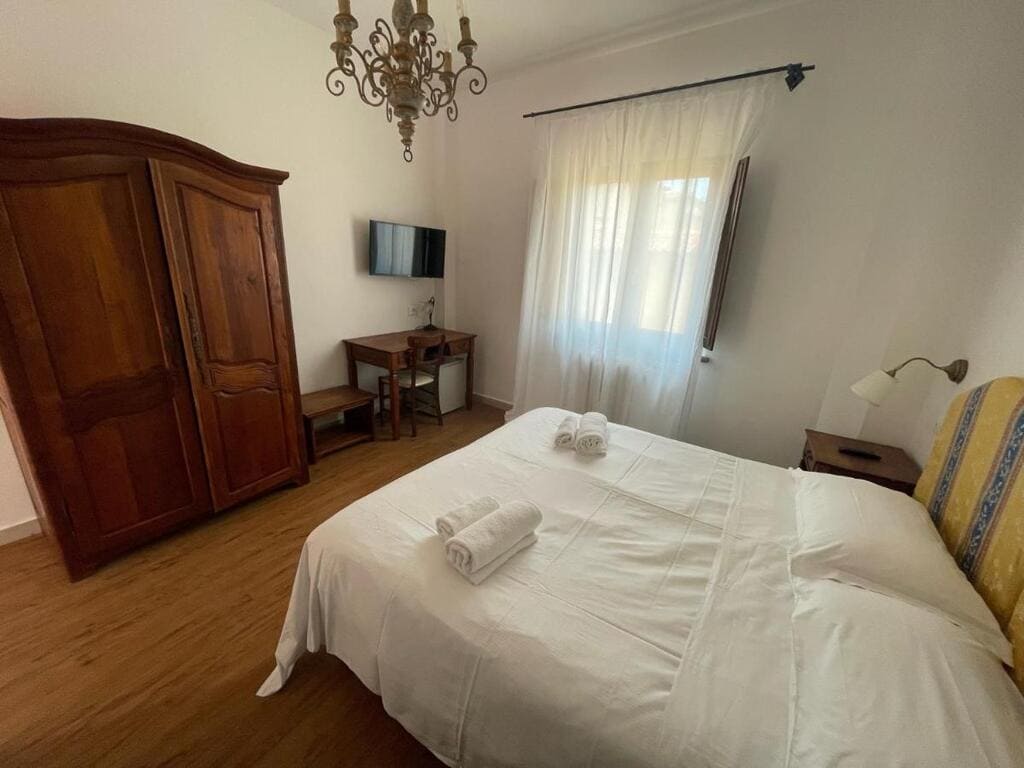

How to get around Pisa
Pisa can easily be explored on foot or by bike.
The city is relatively small with nearly all the sights and attractions conveniently located within walking distance of each other.
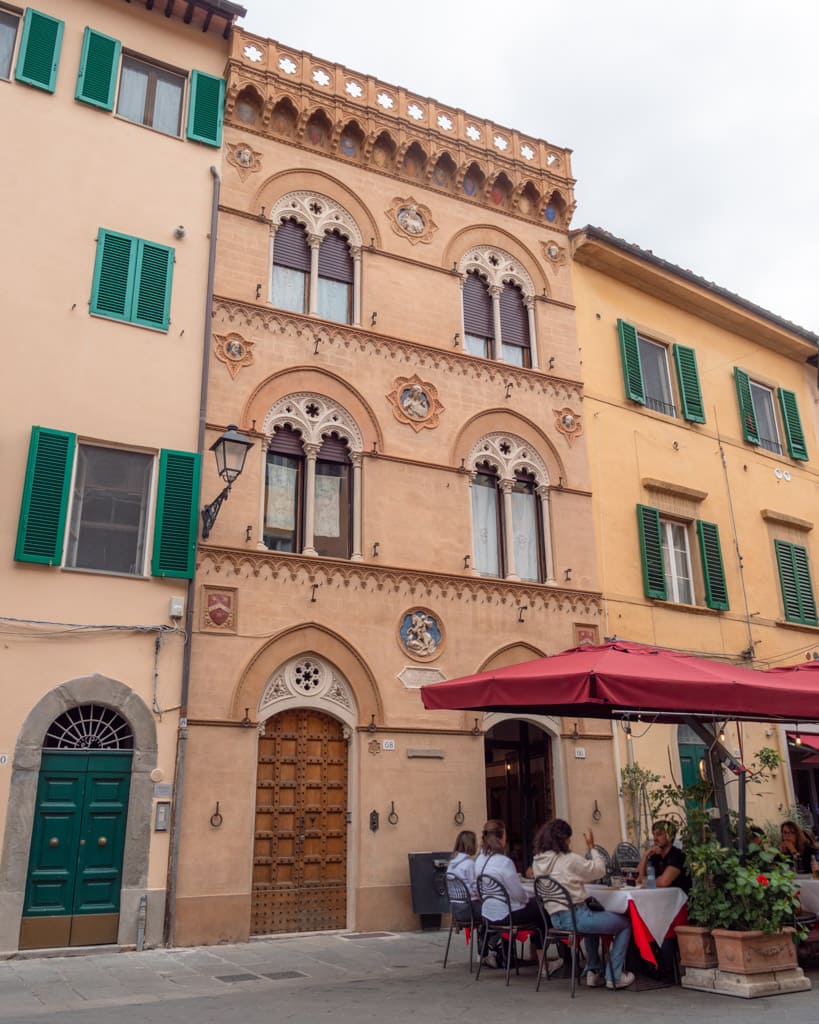
How to get to Pisa
By car
If you drive through Italy, you can easily get to Pisa via one of the motorways that pass by the city.
A car is unnecessary in Pisa so you can park it at your hotel or in one of the many parking lots, typically charging a fixed rate per hour or day.
If you’re fortunate, you may find a white parking spot on the street – those are free. In some cases, you may still need to display a parking disc or indicate the parking duration on a piece of paper on the windshield.
Paid parking spaces are marked in blue, while yellow spaces are reserved for special vehicles and should be avoided.
Public car parks
Search for “parking” or “parcheggio” on Google Maps and make sure to read the reviews of the parking lot.
Prices typically vary from 50 cents to 3 euros per hour. Some of them only take coins.
Be aware that there have been incidents of car break-ins in several of the parking lots. It’s advisable not to leave any valuables in your car, even if you’re stopping in Pisa briefly on your way from one city to another. Also if you’re only planning to be away for an hour or two.
Watch out for ZTL
Note that most streets in the historic part of Pisa are designated as a “zona a traffico limitato” (ZTL), meaning it’s a restricted traffic area with specific regulations for driving and parking.
However, access is typically permitted for bicycles, electric cars, motorcycles, and scooters.
Surveillance cameras are in place, and hefty fines can be incurred for violating the regulations.
If your hotel is located within the ZTL, we recommend contacting them in advance if you plan to drive there.
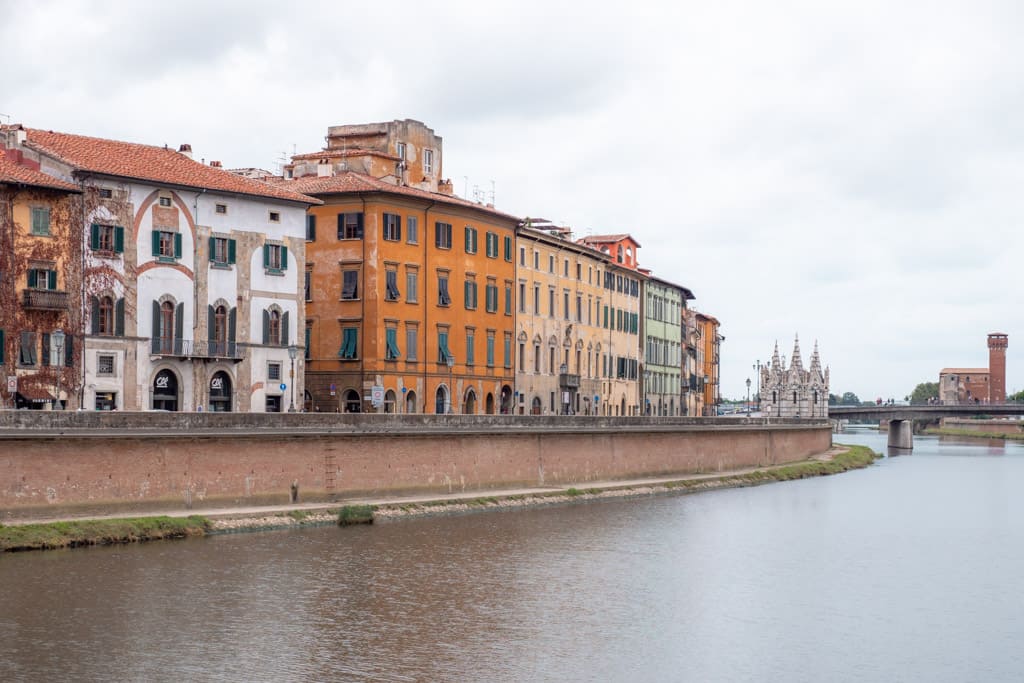
Public transport
It’s easy to get to Pisa by train whether it’s on a day trip or you’re staying in the city for a few days.
Pisa’s Central Station Pisa Centrale is located south of the centre.
From there, it takes 25-30 minutes to walk to the Leaning Tower of Pisa and the Square of Miracles, passing several other interesting sights in Pisa on the way.
The train station, Pisa San Rossore, is even closer, with only a fifteen-minute walk to the square and the tower.
If you visit Pisa on a day trip, you can consider arriving at one train station and departing from the other.
The train stations are connected to several cities in the region, for example, Lucca, Livorno, Florence and Siena.
We took the train from Lucca when we visited Pisa.
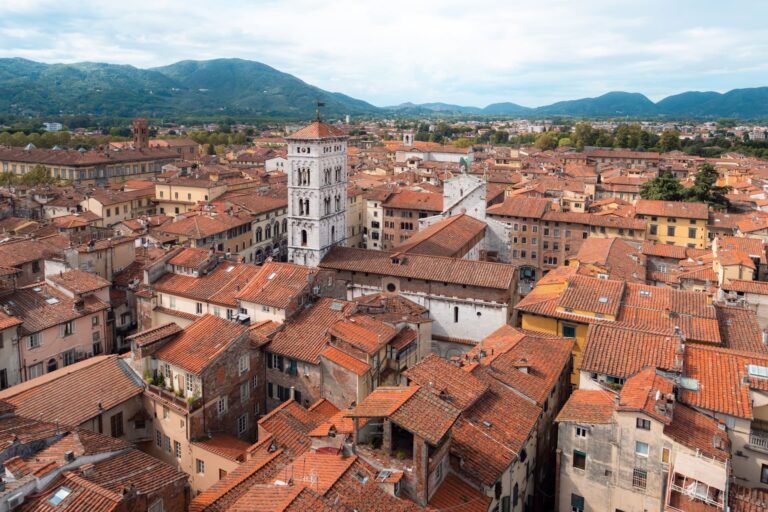
Flights to Pisa
If you don’t drive to Pisa, you can fly directly to Pisa International Airport (PSA), also known as Galileo Galilei.
From the airport, it only takes 7 minutes by train to the Central Station.
Search for flights to Pisa on Momondo here (adlink).
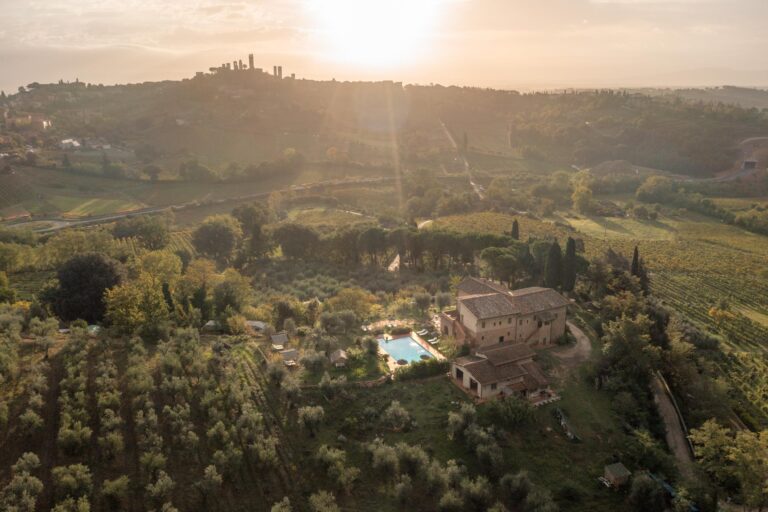
When to visit Pisa
Due to the iconic Leaning Tower, Pisa attracts tourists year-round.
The high season is in July and August when Italians, Europeans and much of the rest of the world enjoy their summer holidays.
July and August are also the hottest months, so if you have the flexibility to plan your trip to Pisa outside of this period, we strongly recommend doing so.
May, June, September and October are good shoulder months with great weather and fewer crowds, although it is always busy in Tuscany after all.
December, January and February are the coldest months (like many other places in Europe).
It rains the most in September, October, November and December.


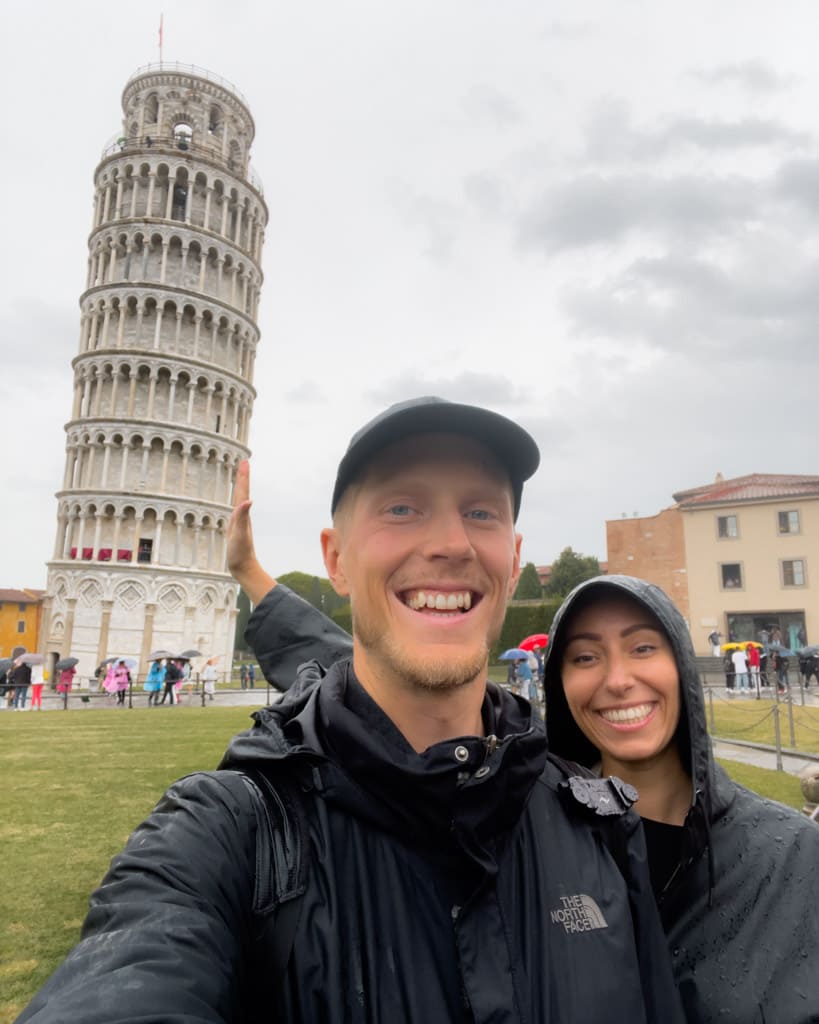
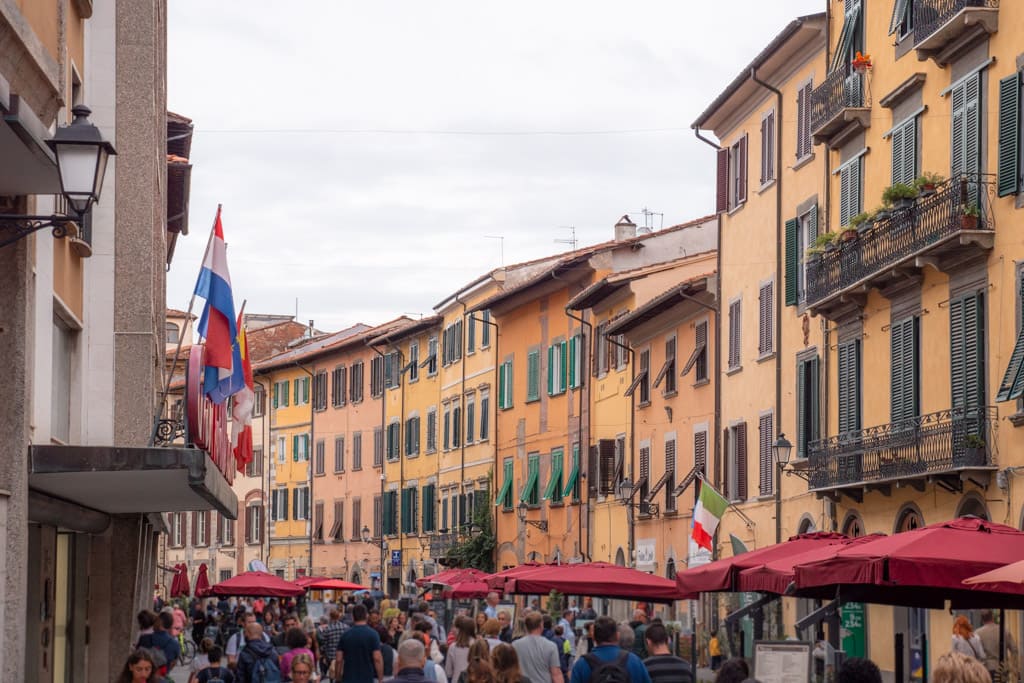

Our best tips for Pisa
- Book a ticket in advance (adlink) if you want to climb the Leaning Tower of Pisa. A limited number of tickets are available each day, and visitors are assigned a specific time slot to ascend the tower.
- Buy a combination ticket (adlink) to save money if you plan to visit all the buildings on the Square of Miracles. With this ticket, you’ll also enjoy the perk of skipping the queues.
- Come early if you want to experience the Leaning Tower (and the rest of Pisa) without too many crowds. Alternatively, you can wait until the end of the day, when most day-trippers have gone home.
- Many restaurants close for siesta between lunch and dinner, so keep an eye on the opening hours if you want to eat at a particular restaurant or café during the day.
- Expect an additional charge on the restaurant bill. Most restaurants add a “coperto” per guest, which is a fee per person regardless of your order. It is typically between 1 and 3 euros, which you pay in addition to the price of the food. It’s common to receive a small bread basket with butter or olive oil and balsamic vinegar as a starter.
- Take care of your belongings. Like many tourist destinations, there is a risk of opportunistic pickpockets. Additionally, car break-ins are not uncommon. If you’re driving to Pisa, it’s advisable not to leave any valuables in your car to minimise the risk.
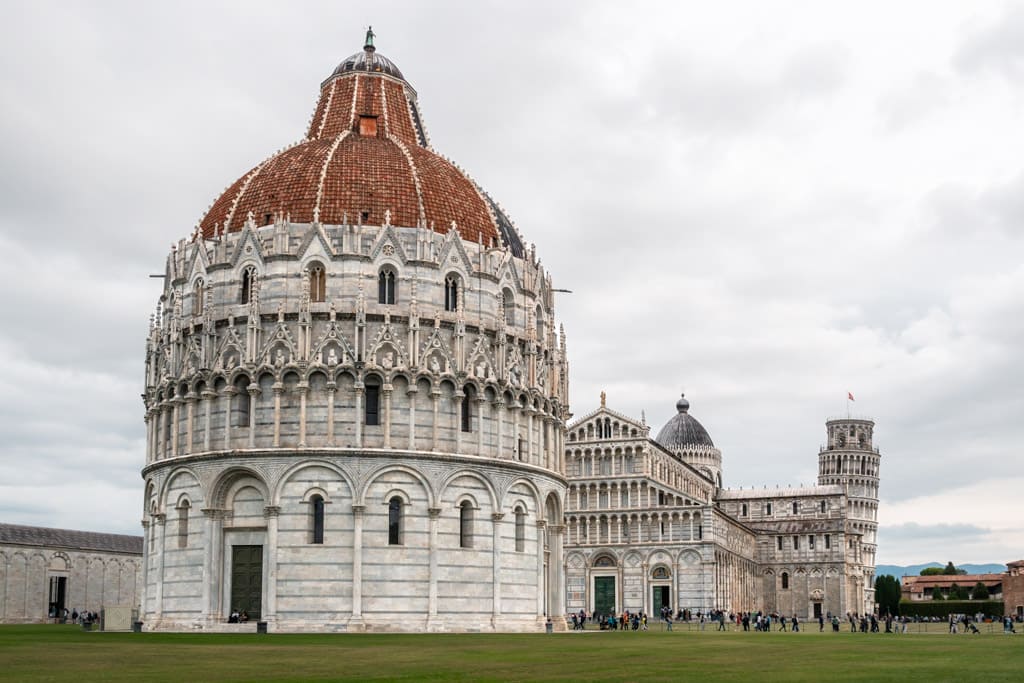
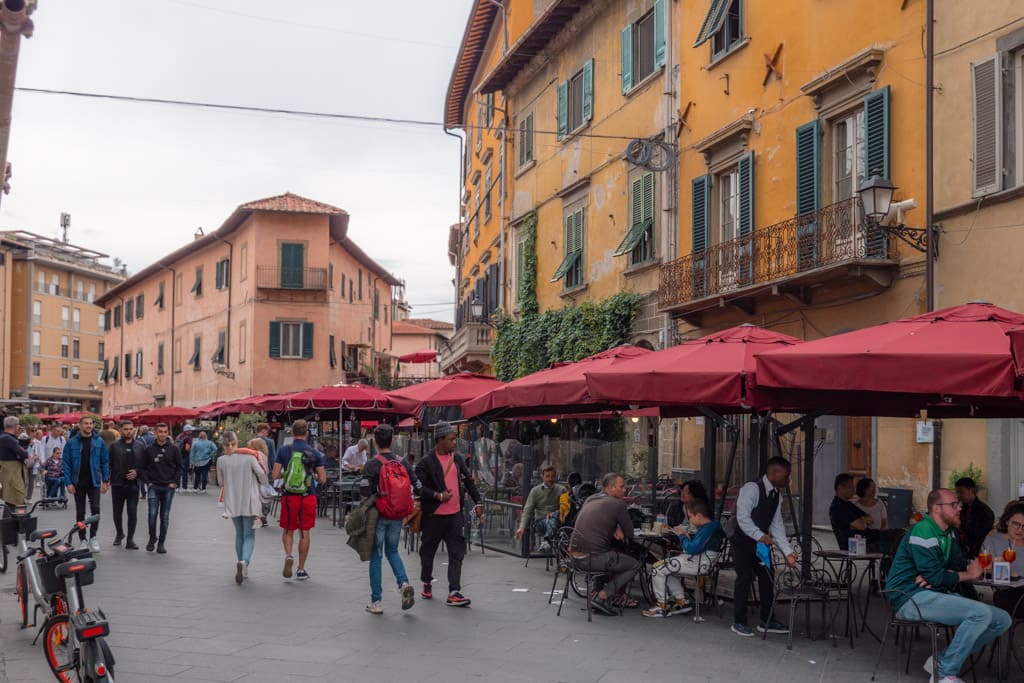
What to bring to Pisa
- Travel insurance (adlink). Never travel without it!
- A good camera – here’s a guide to the gear we use.
- Sunscreen. Especially if you visit Pisa in the summer. We recommend an organic, vegan sunscreen without oxybenzone and other harmful chemicals.
- Sneakers or other types of shoes you can walk in comfortably.
- A refillable water bottle.
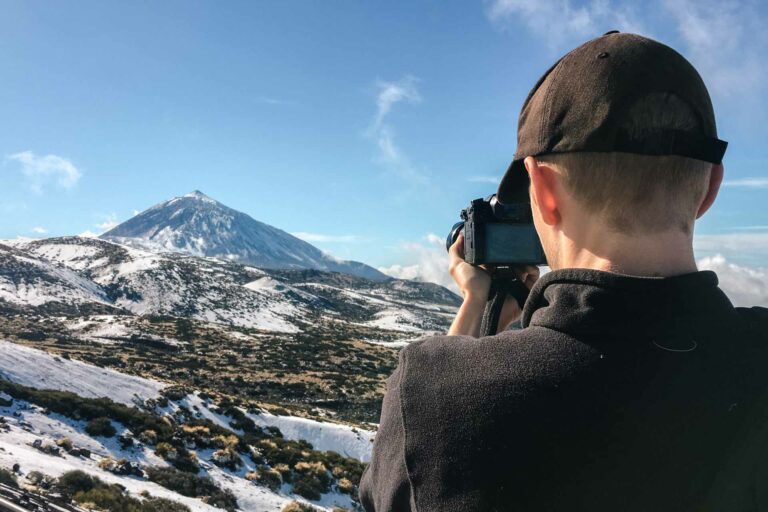
Sustainable travel tips
To travel as sustainably as possible, we recommend the following:
- Bring your own drinking water in a refillable bottle.
- Avoid disposable plastics.
- Sort your waste correctly and do not throw it on the ground.
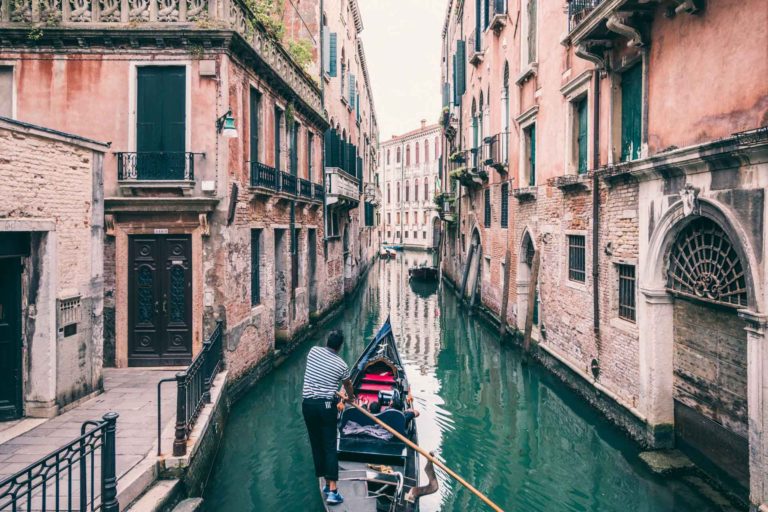
Thank you for reading
Thank you for reading our travel guide to Pisa. We hope it has been helpful!
What do you think of the sights and things to do in Pisa?
Don’t hesitate to ask us anything in the comments below if you haven’t been to Pisa yet. We are happy to help.
And if you’ve already visited the Leaning Tower, it would be great to hear your best tips and tricks on what to do and see when in Pisa.
Our favourite travel resources:
- Booking.com for cheap hotels.
- Momondo for the best flight deals.
- SafetyWing for travel insurance. We also like World Nomads and True Traveller. All three compared here.
Our camera gear:
- Panasonic GH5. Used for all of our photos and videos.
- DJI Mavic 2 Pro. Best drone out there!
- Sirui Tripod. Lightweight and strong.
- See all of our camera gear here.
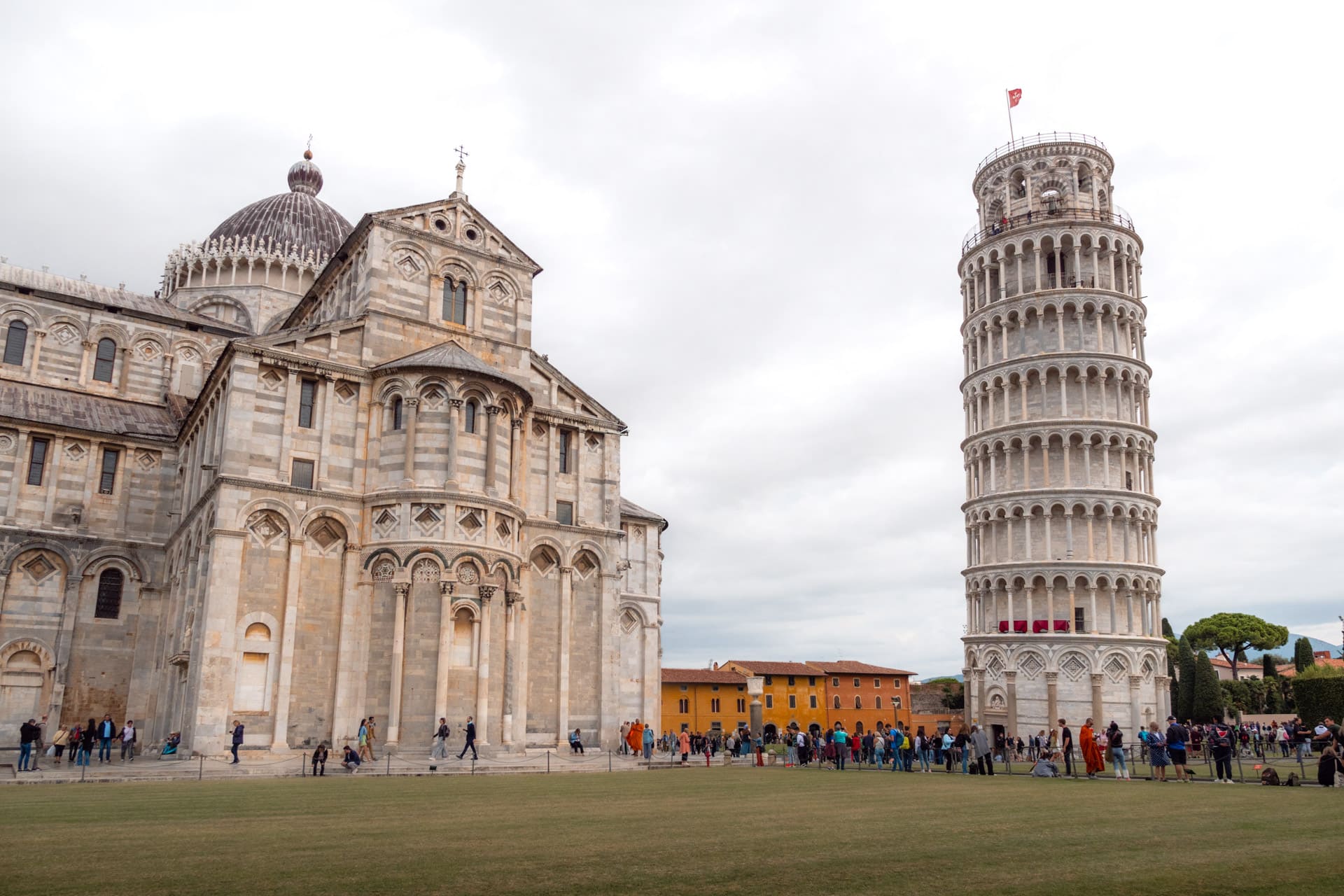

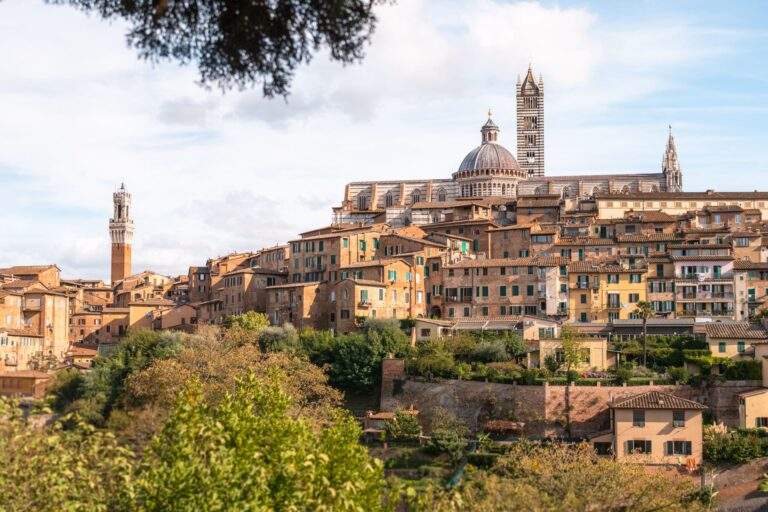
 Book cheap hotels
Book cheap hotels  Find the best flight deals
Find the best flight deals  Nomad insurance
Nomad insurance  Our Camera Gear
Our Camera Gear Our Packing List
Our Packing List